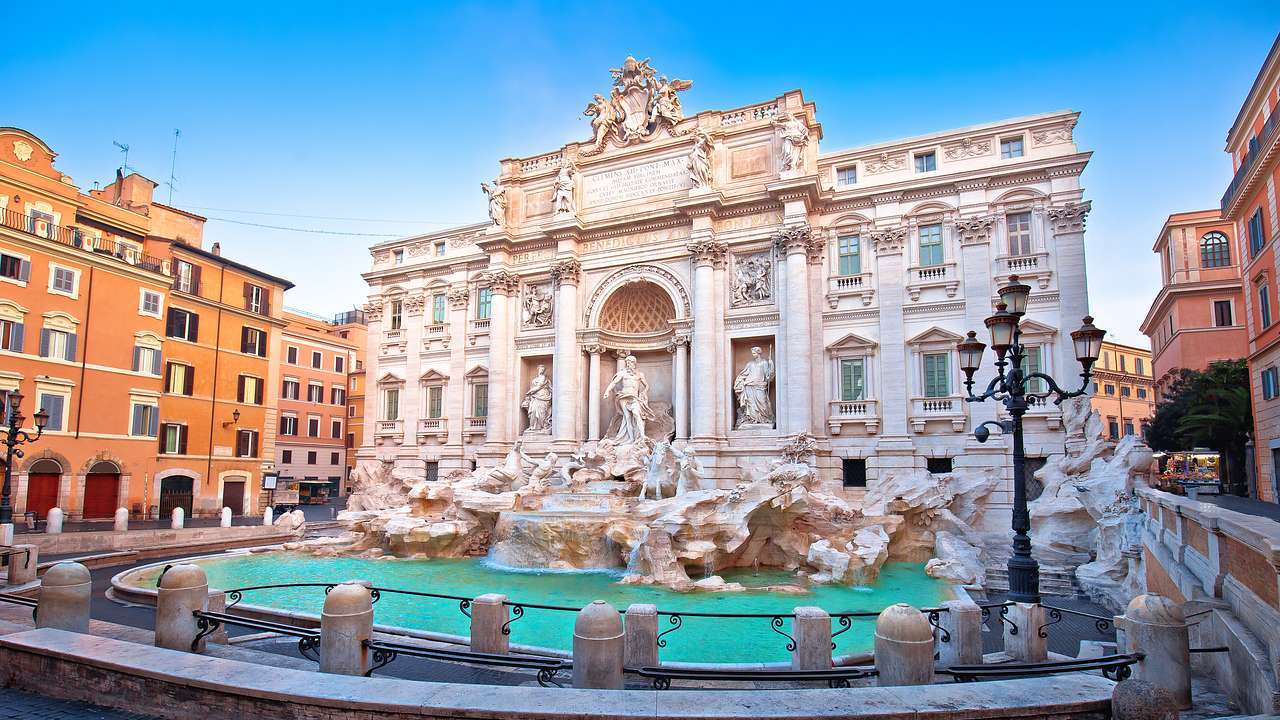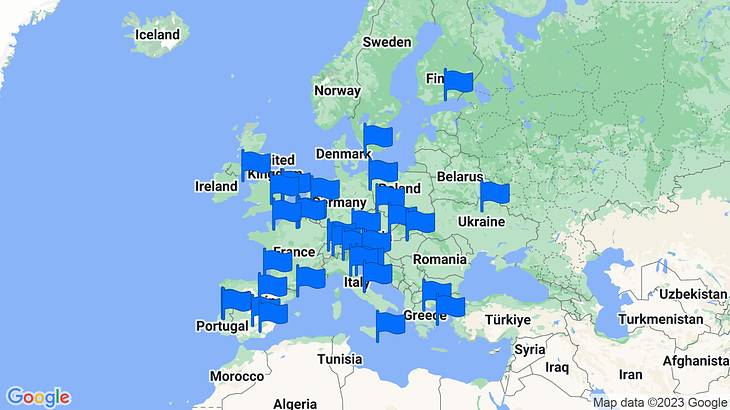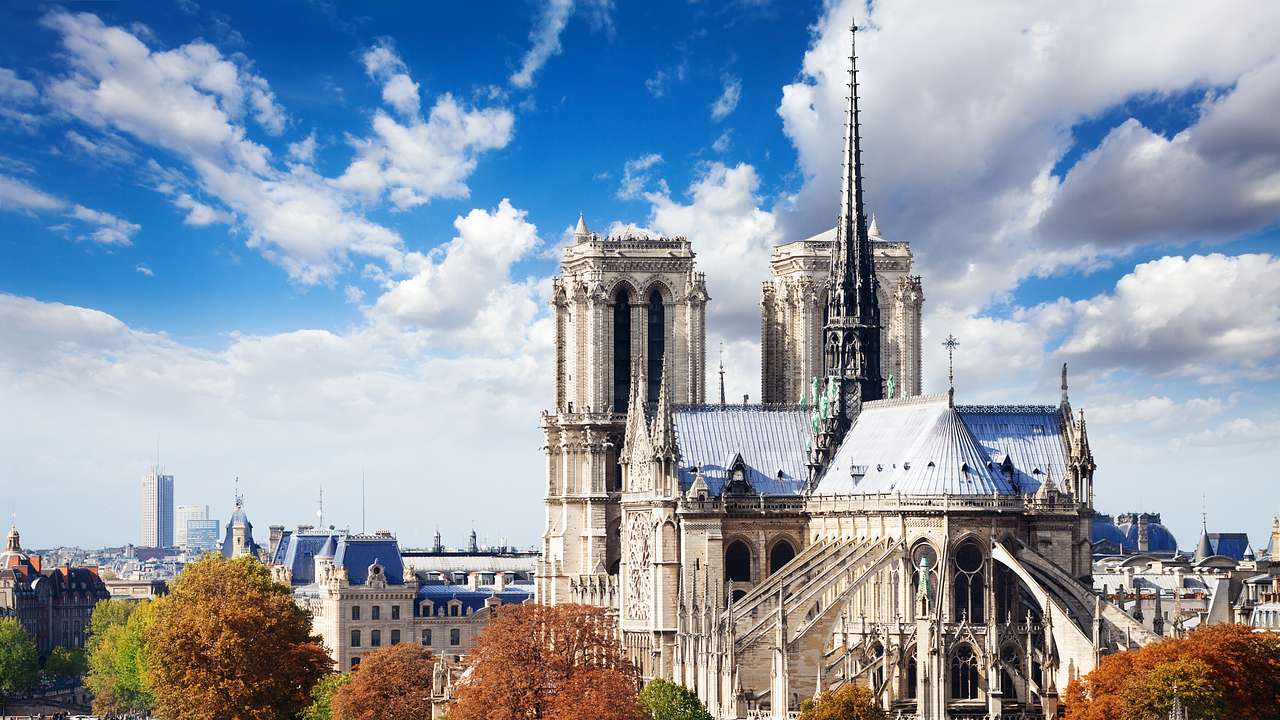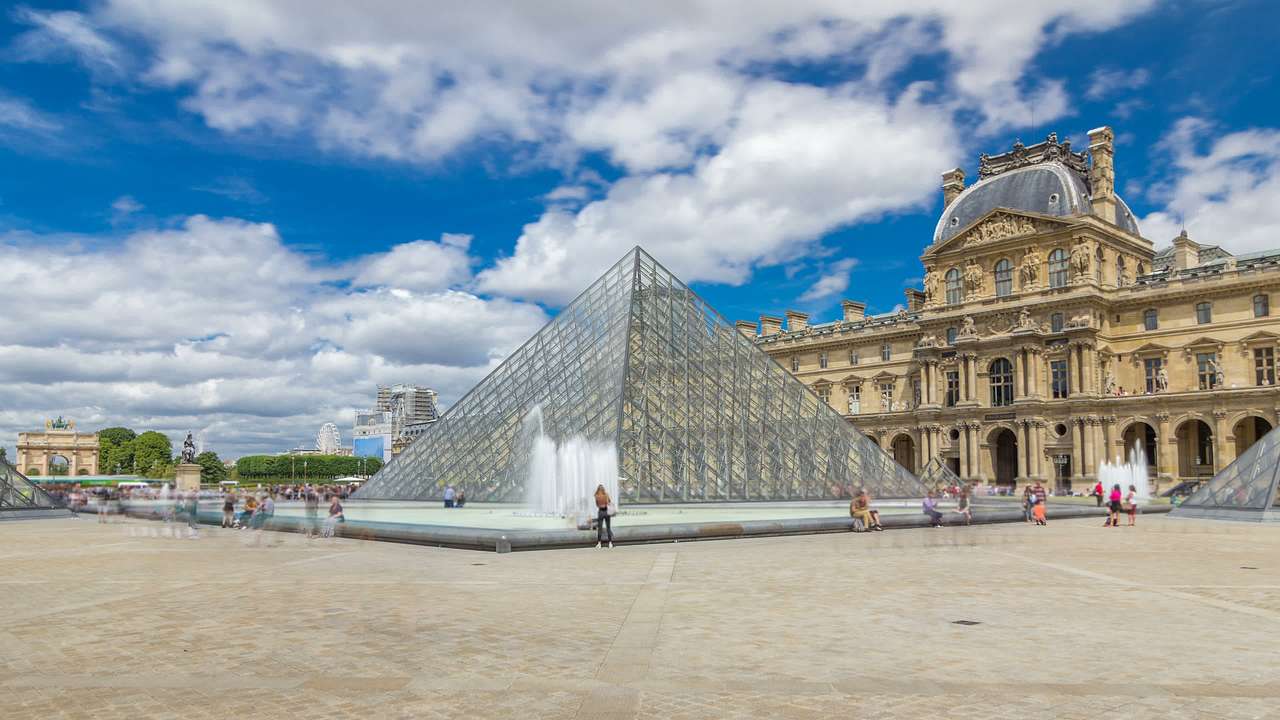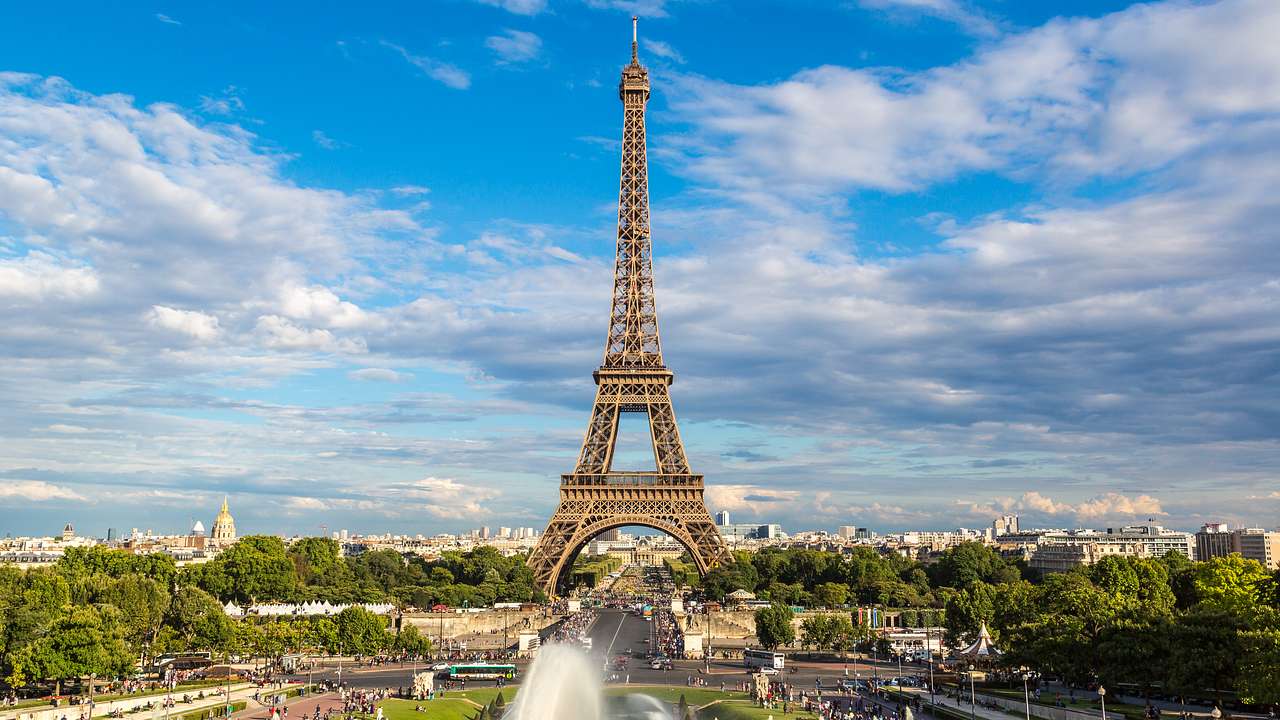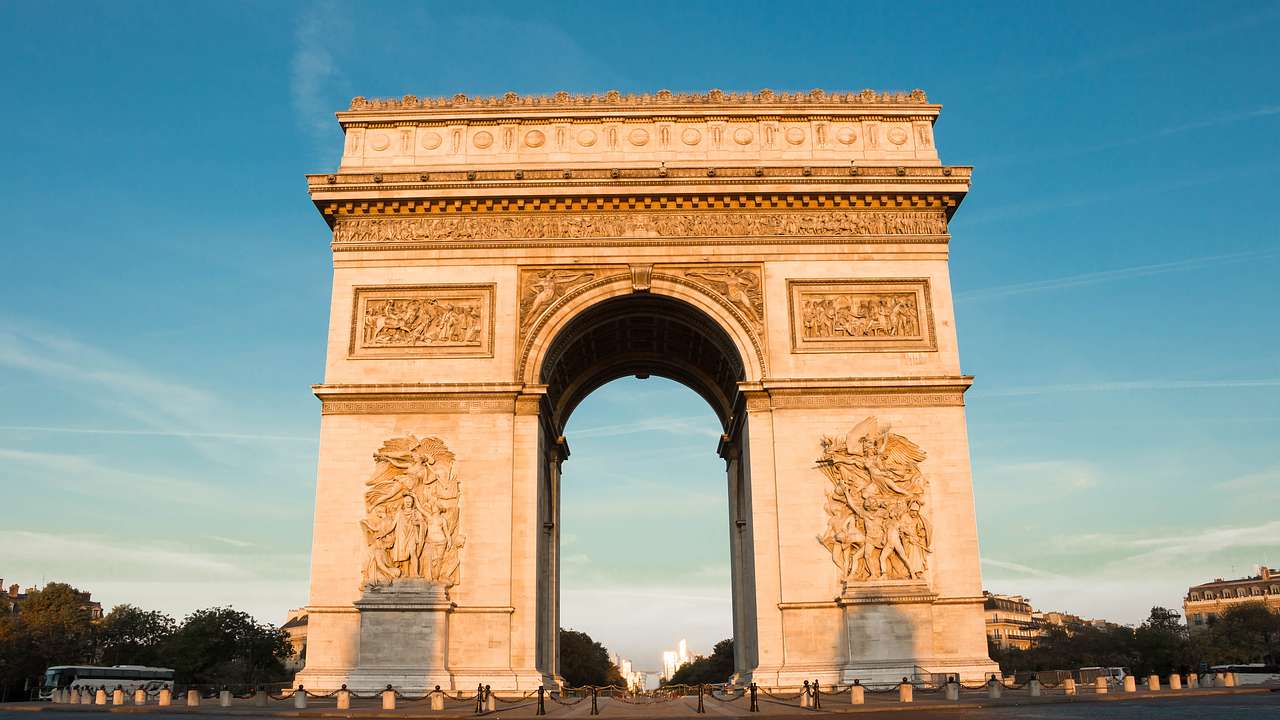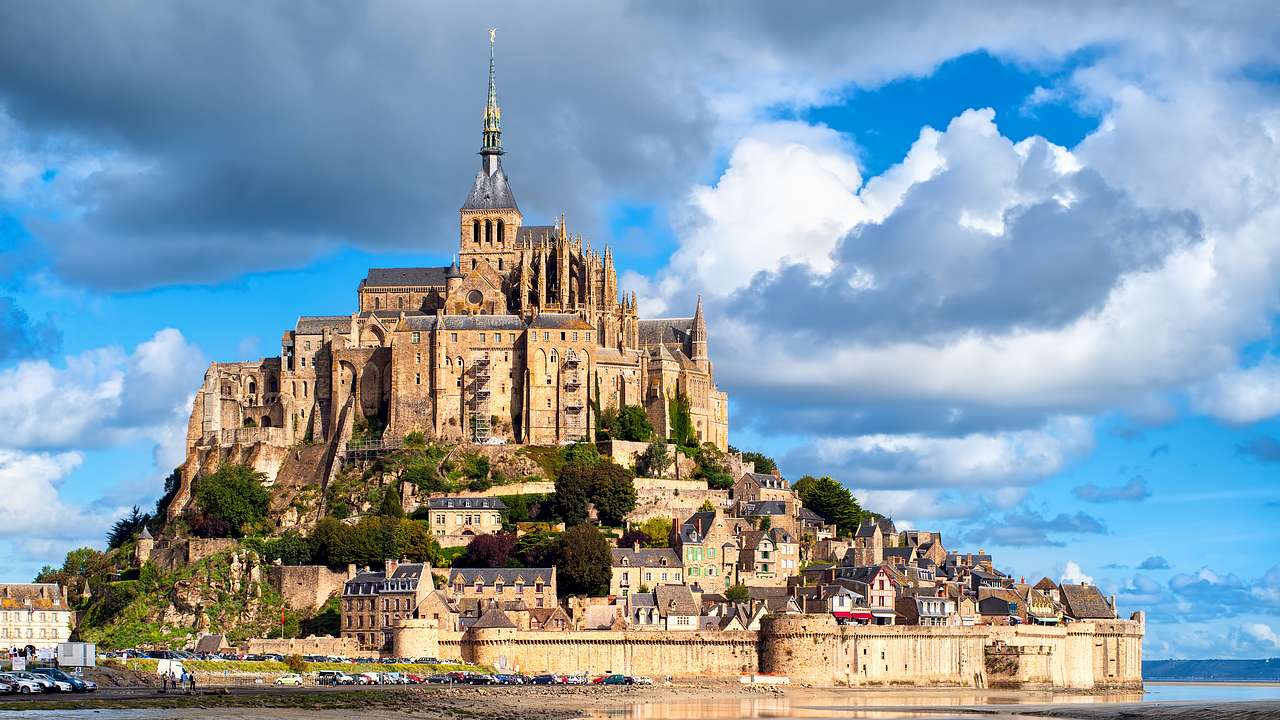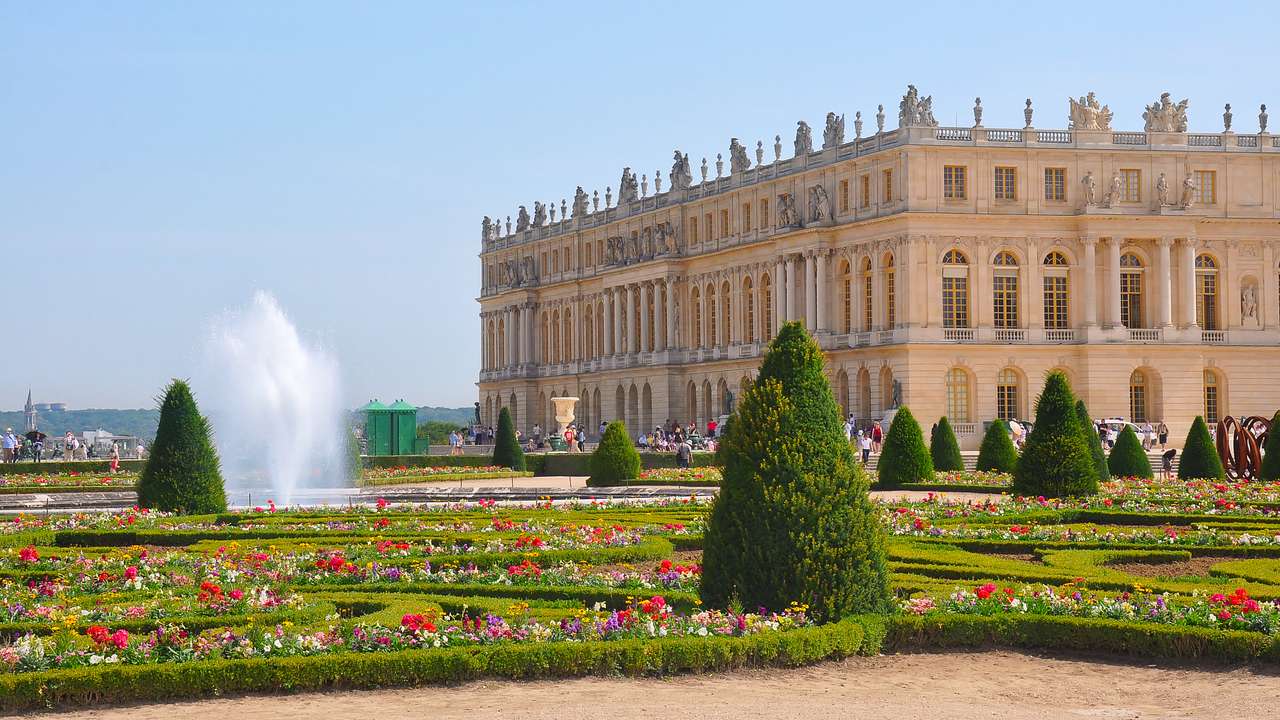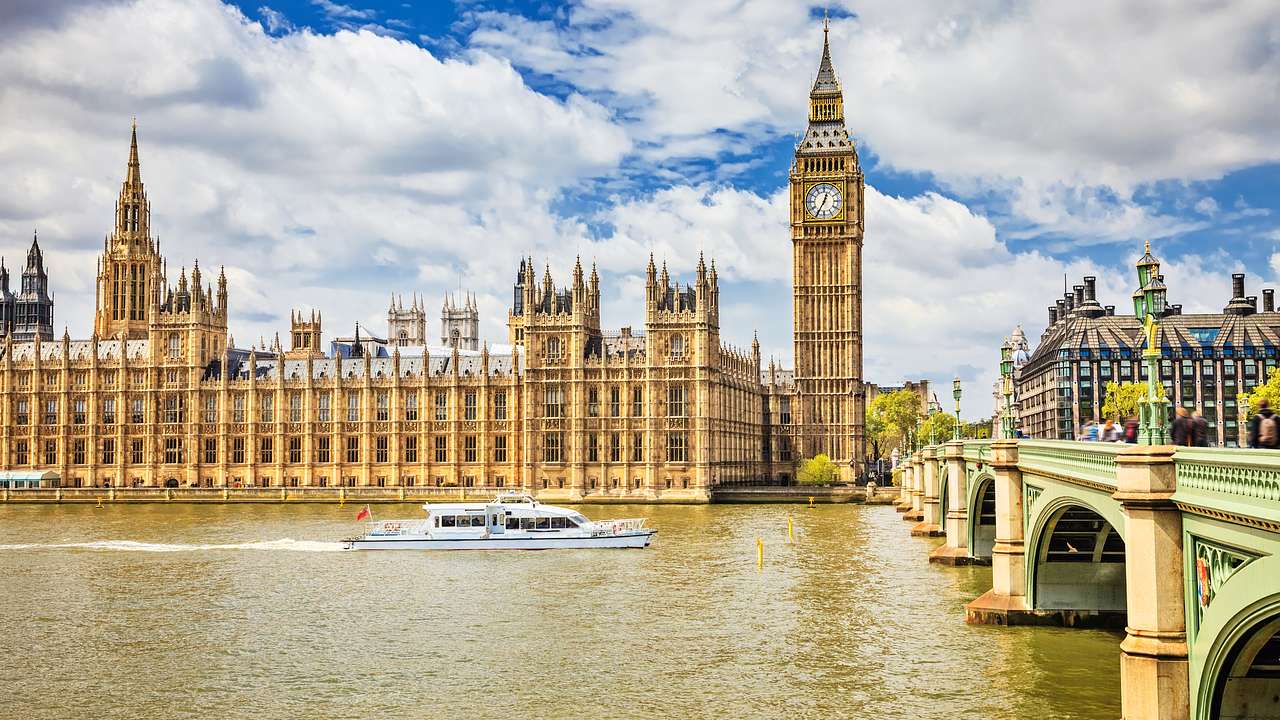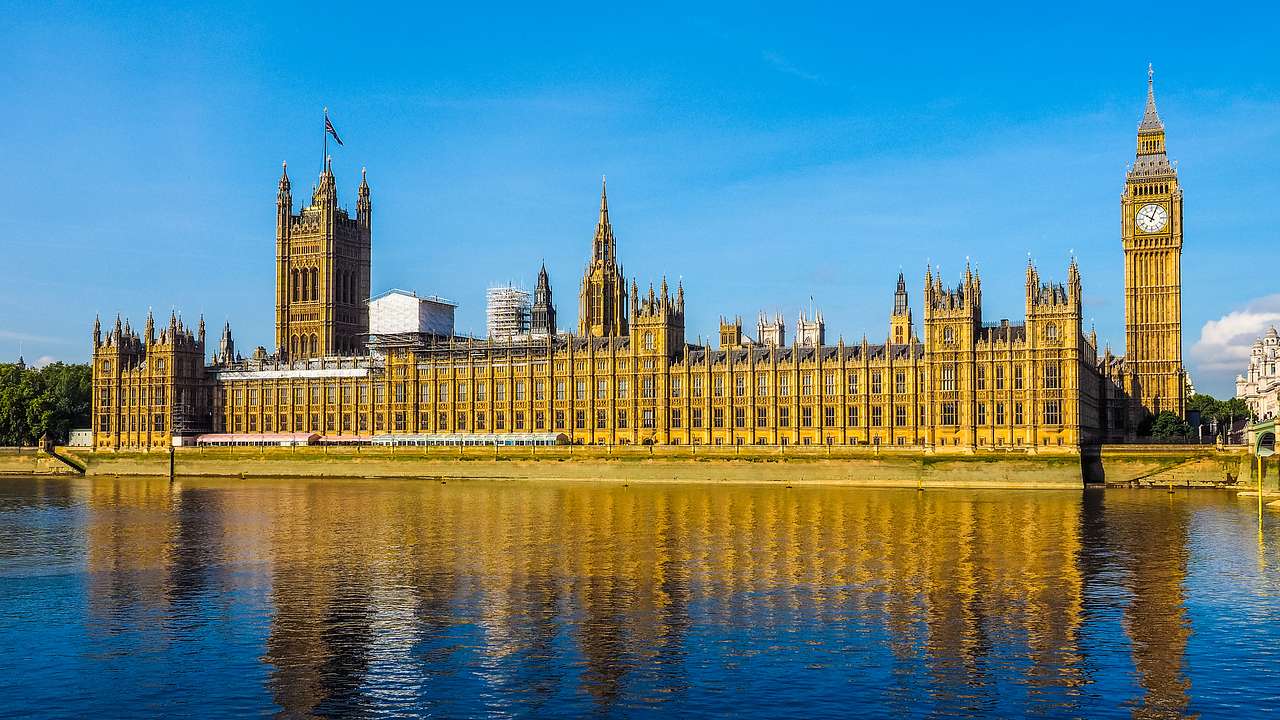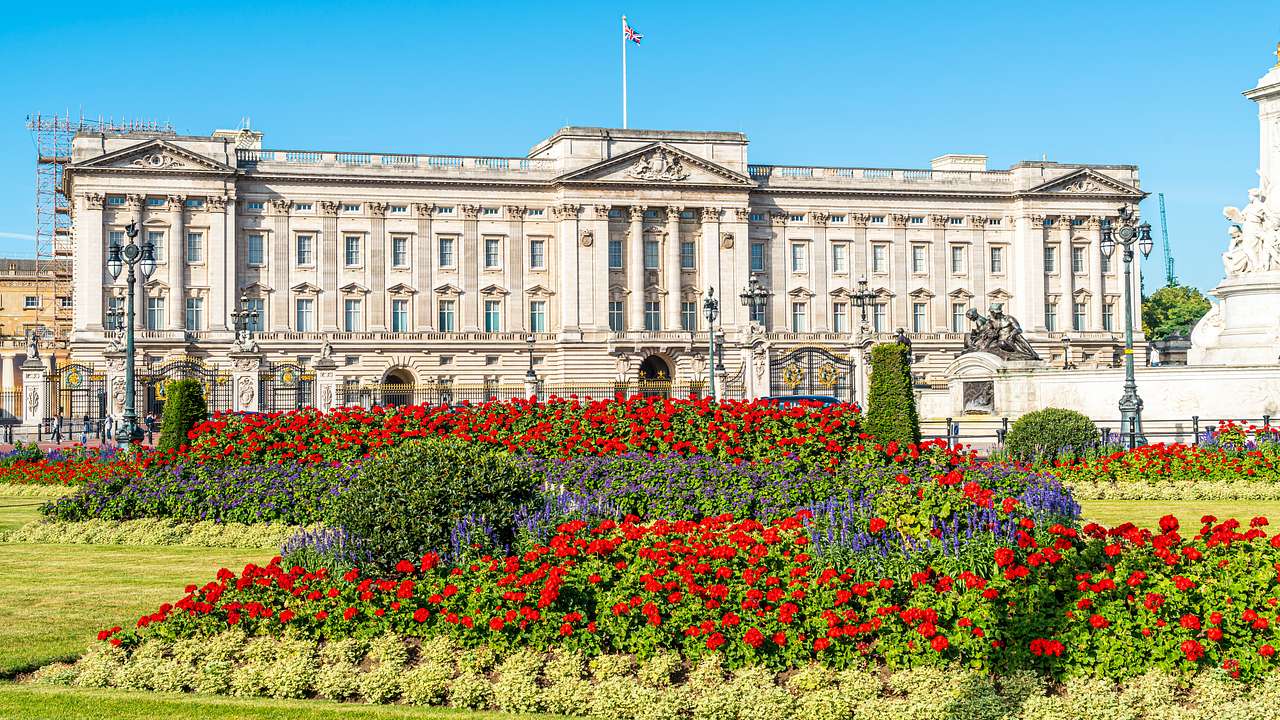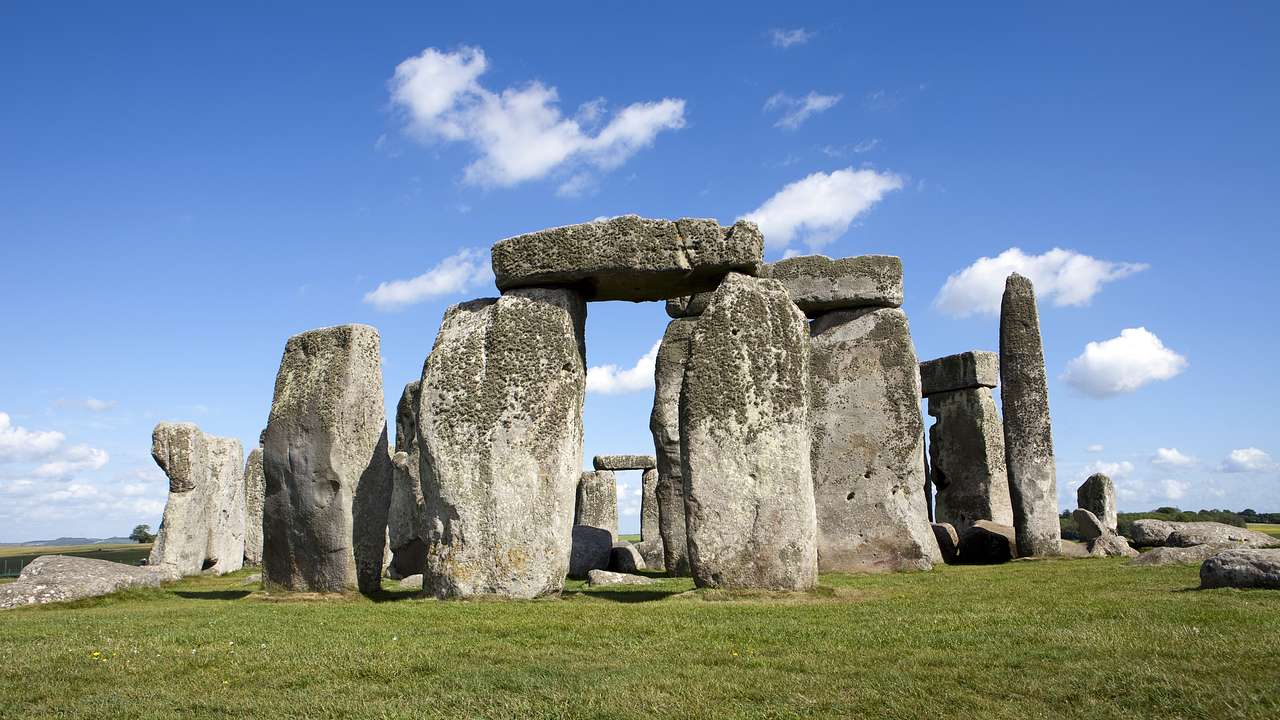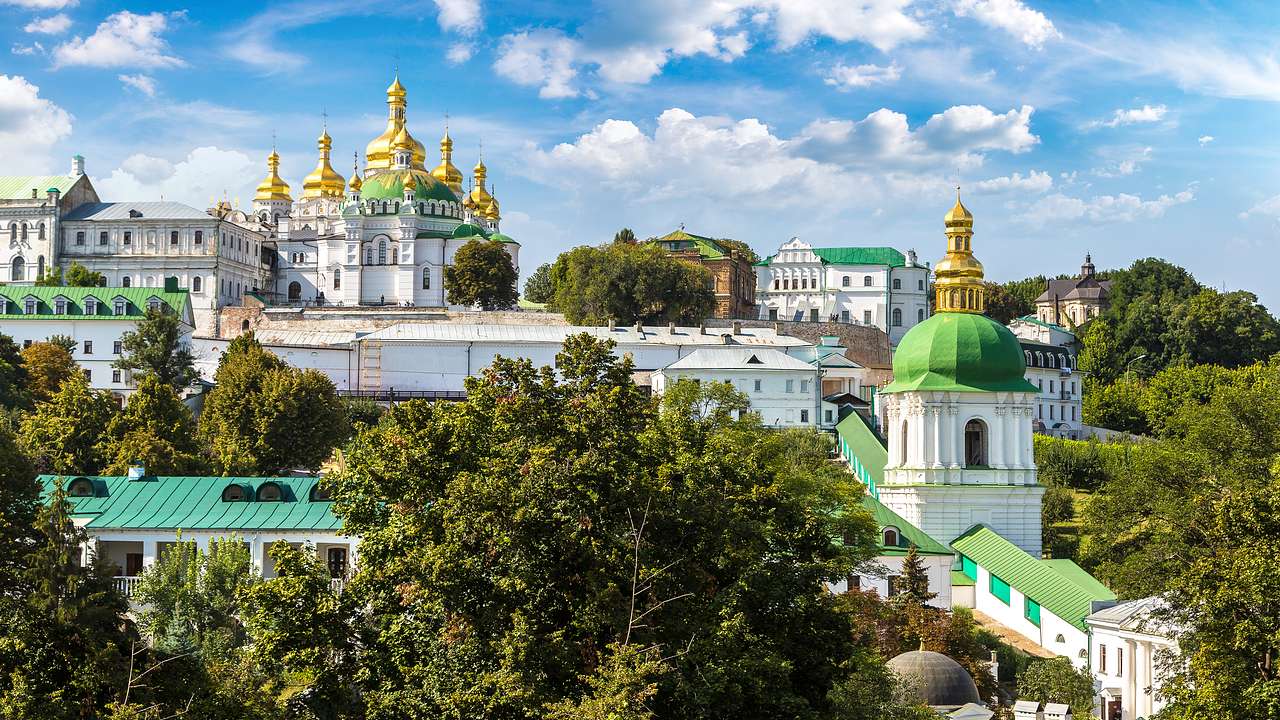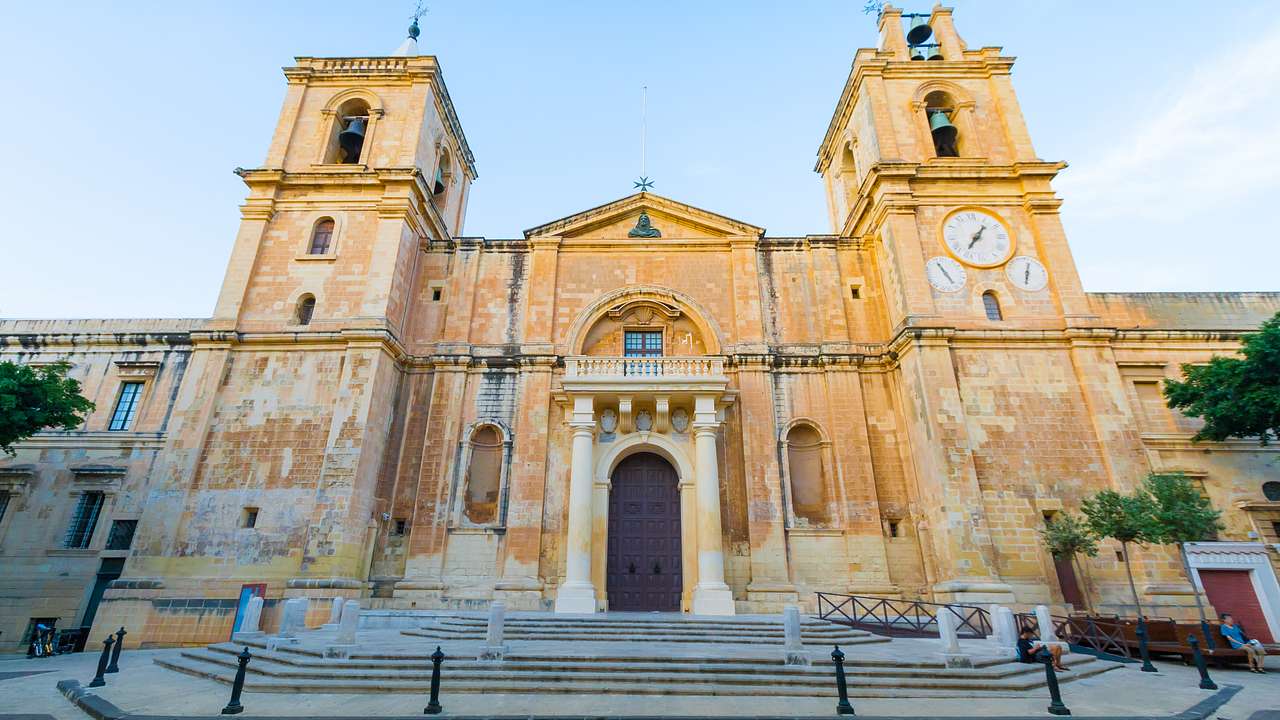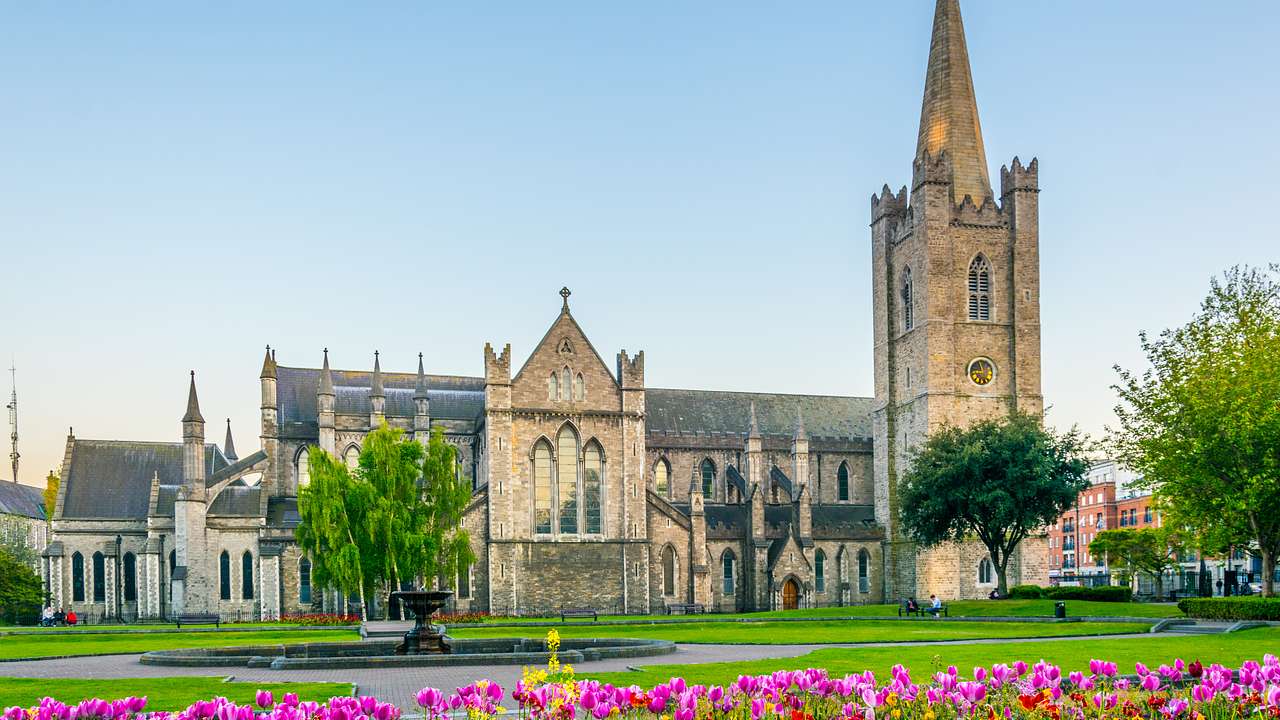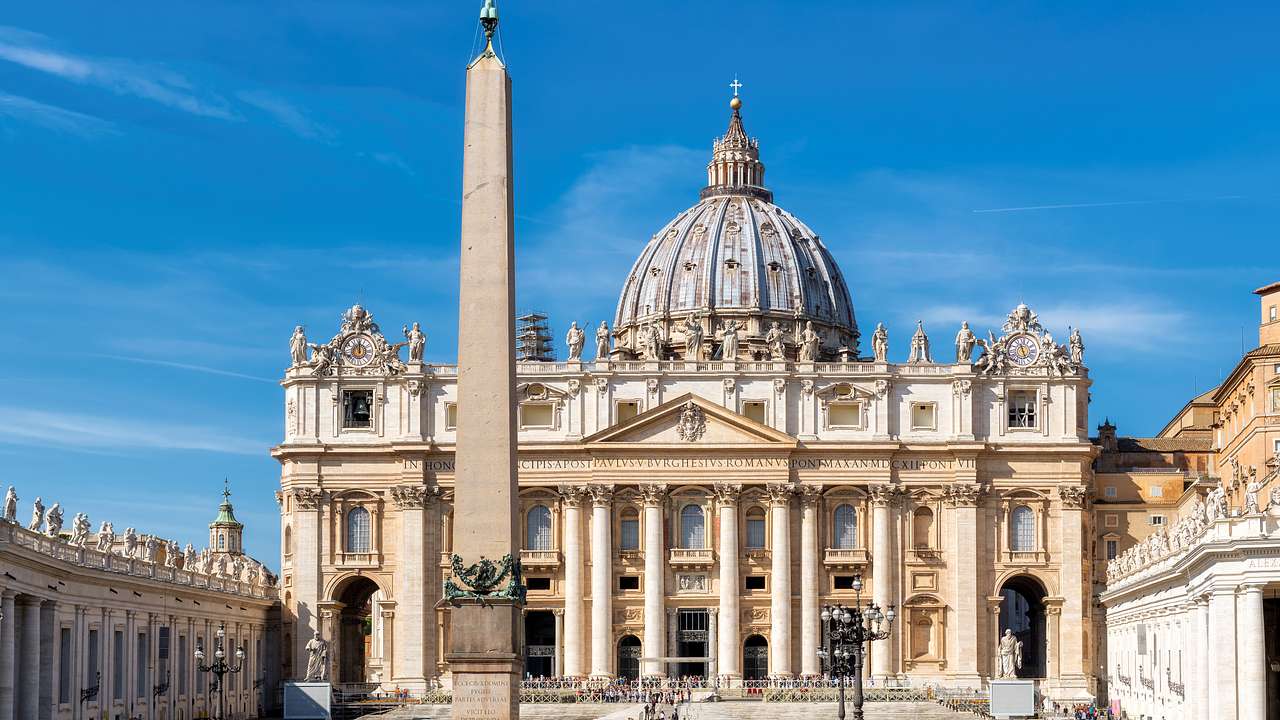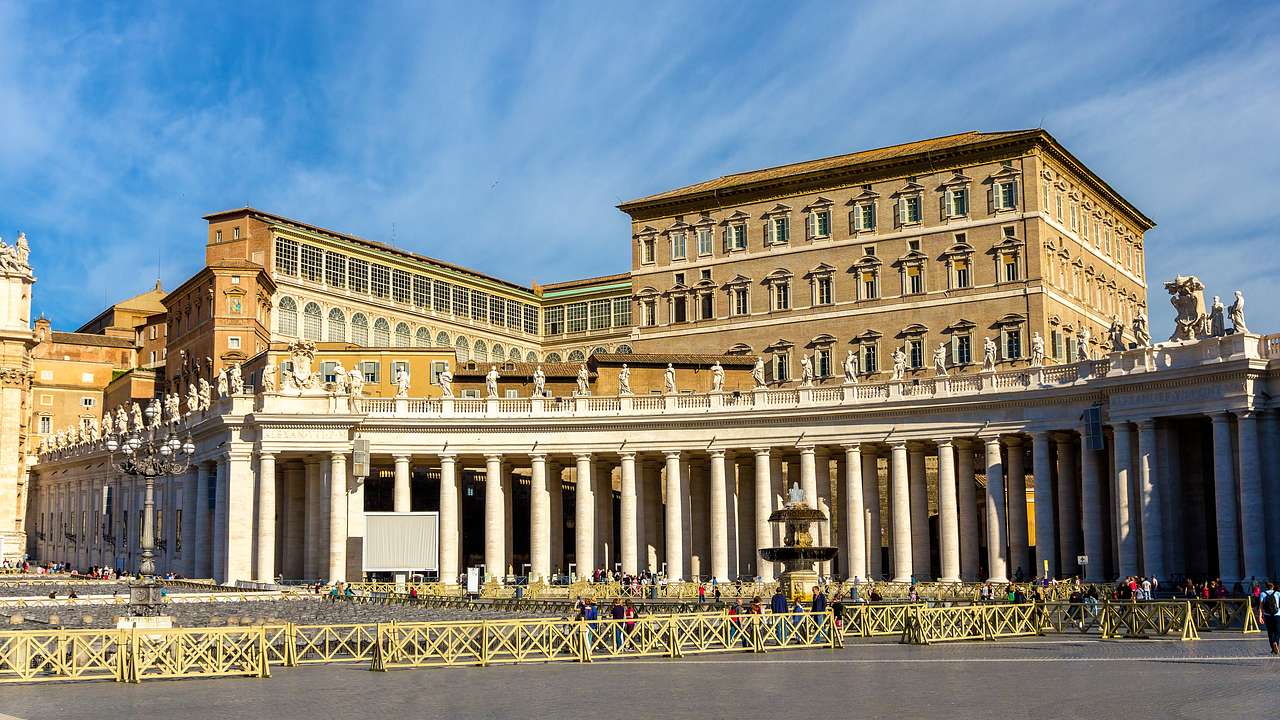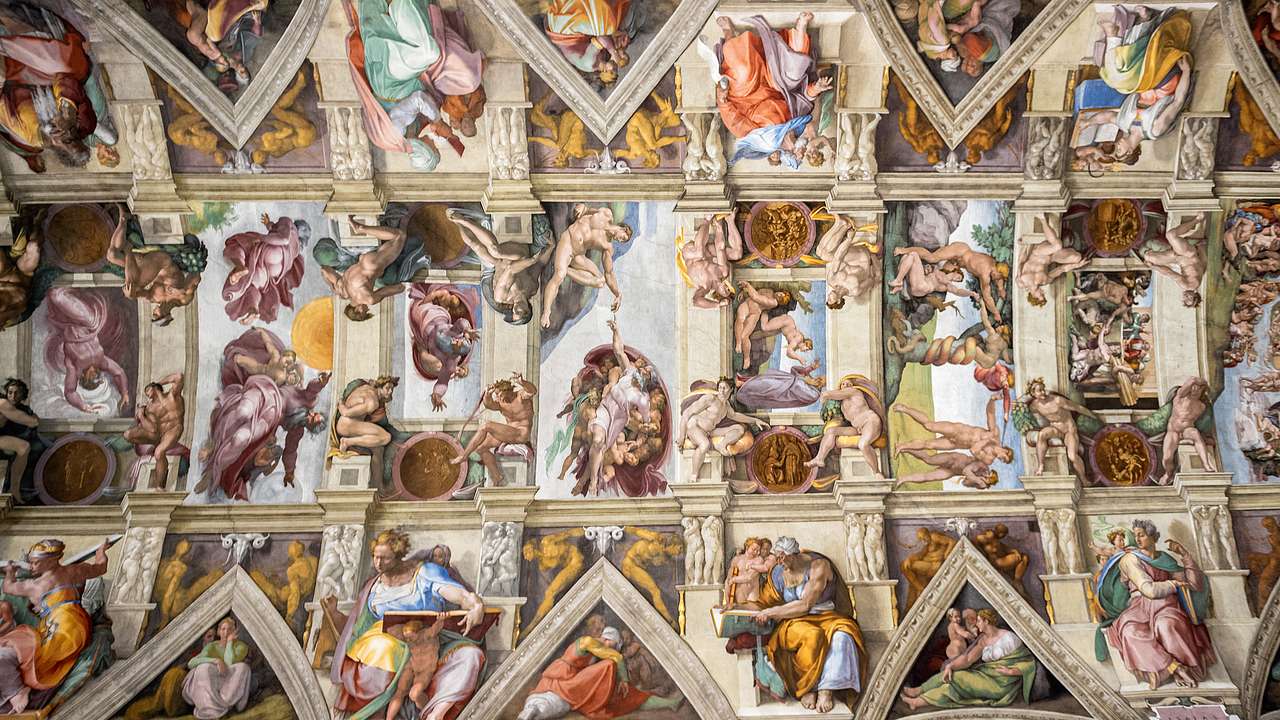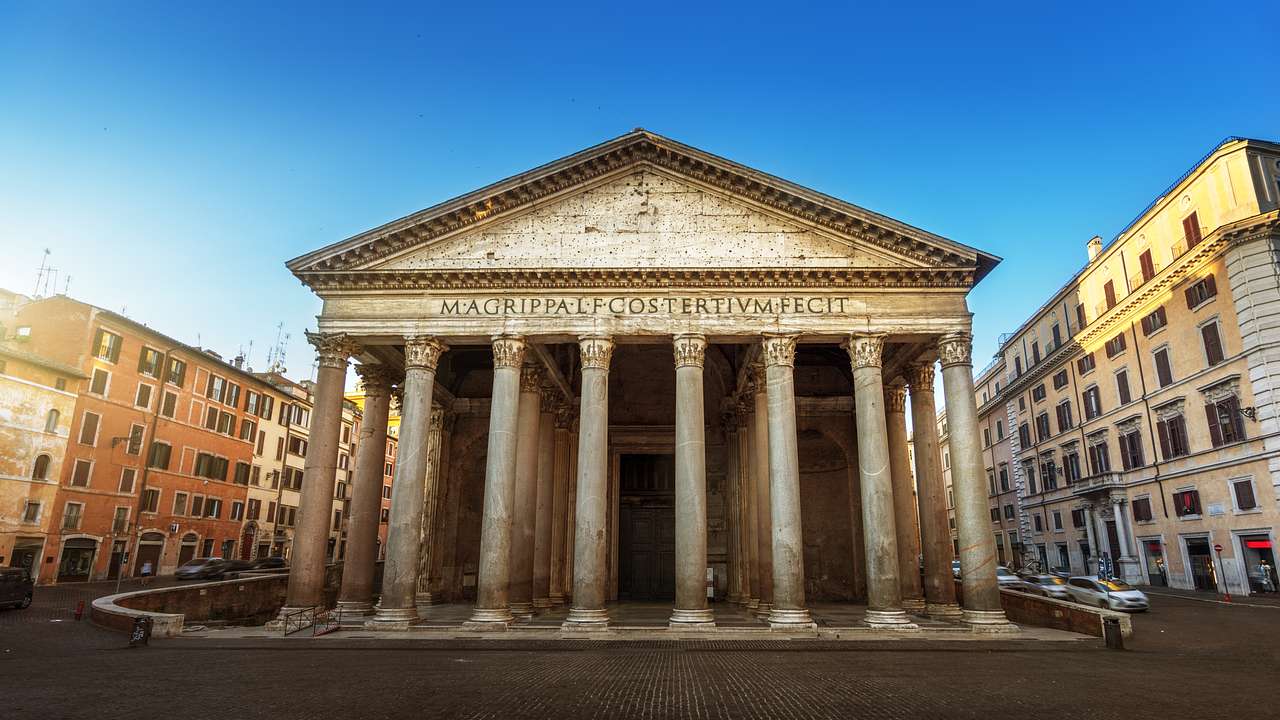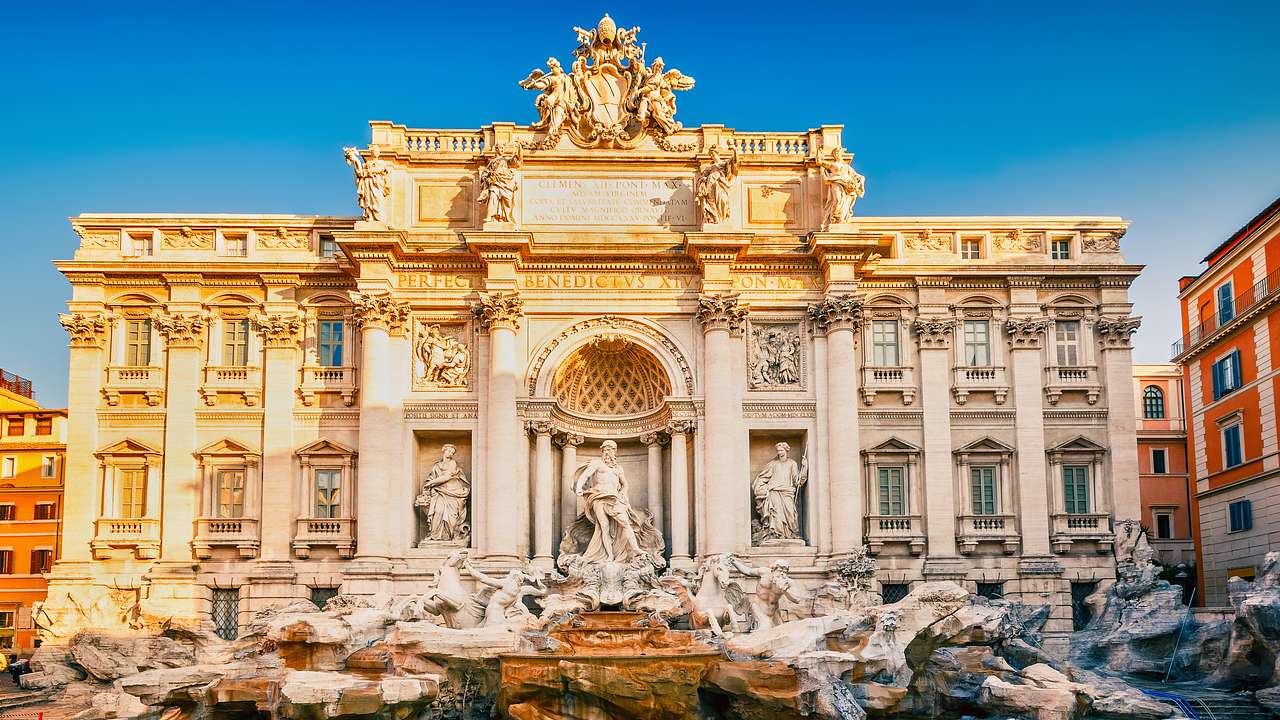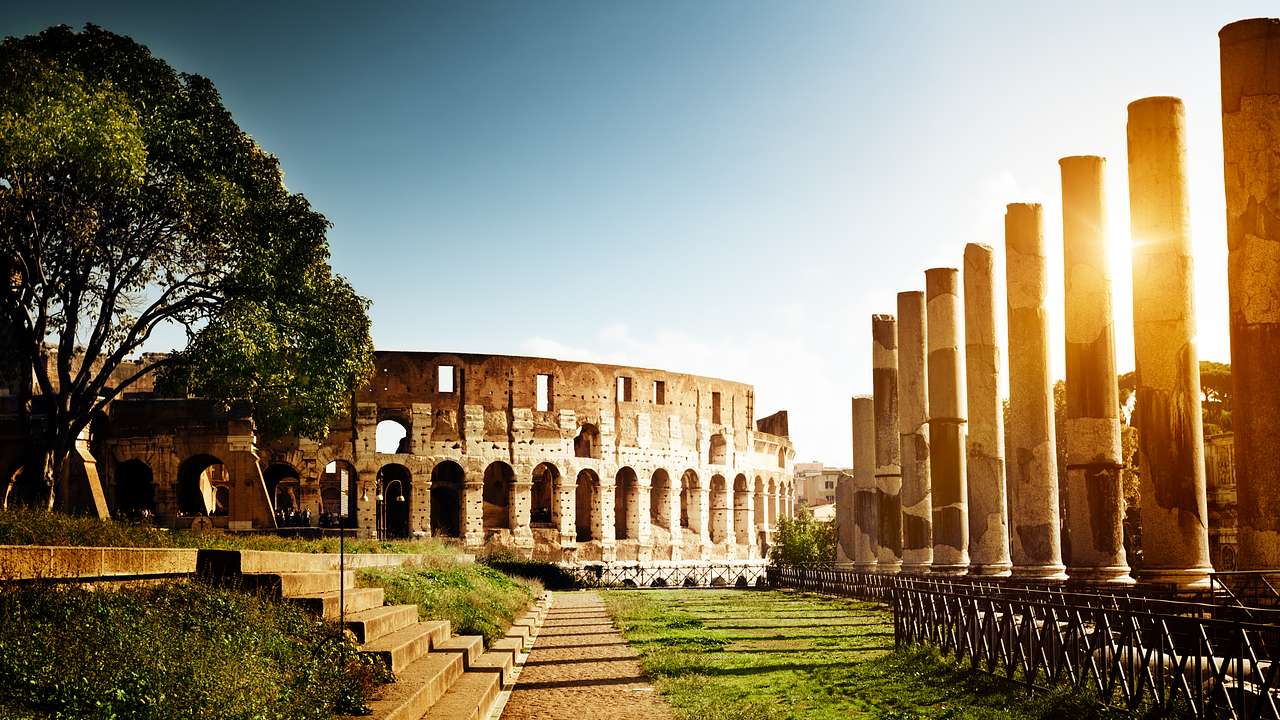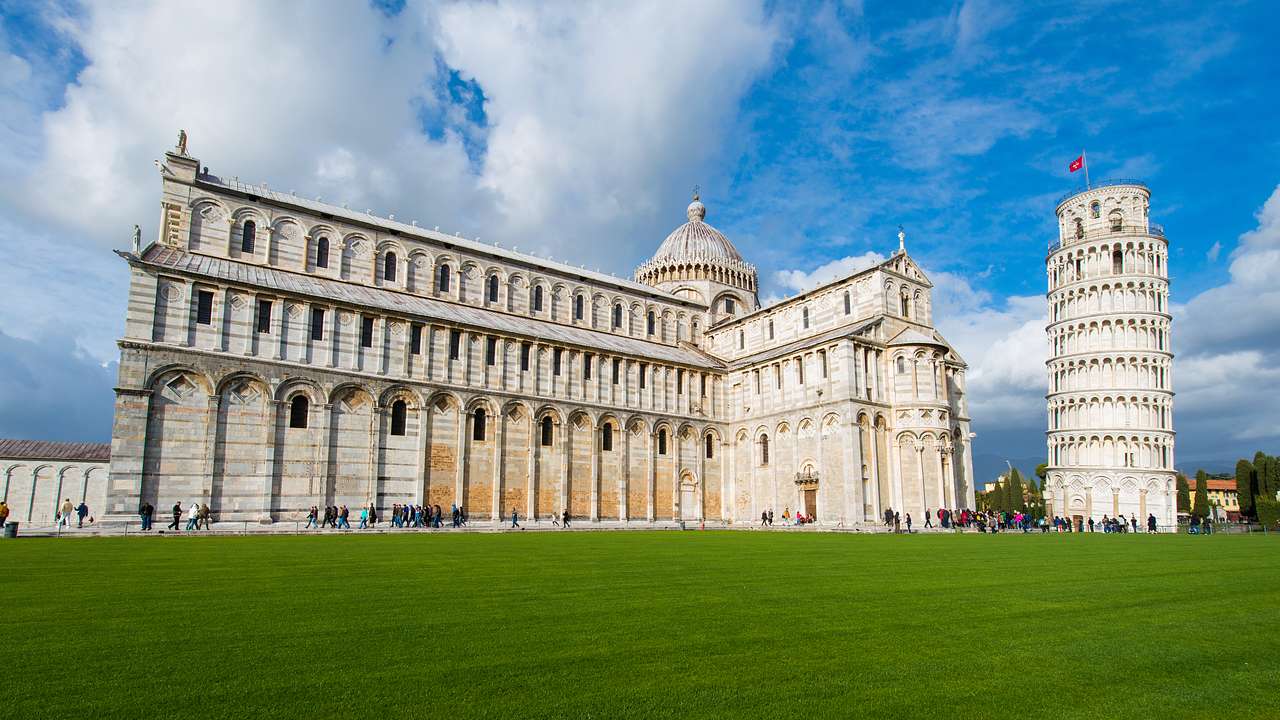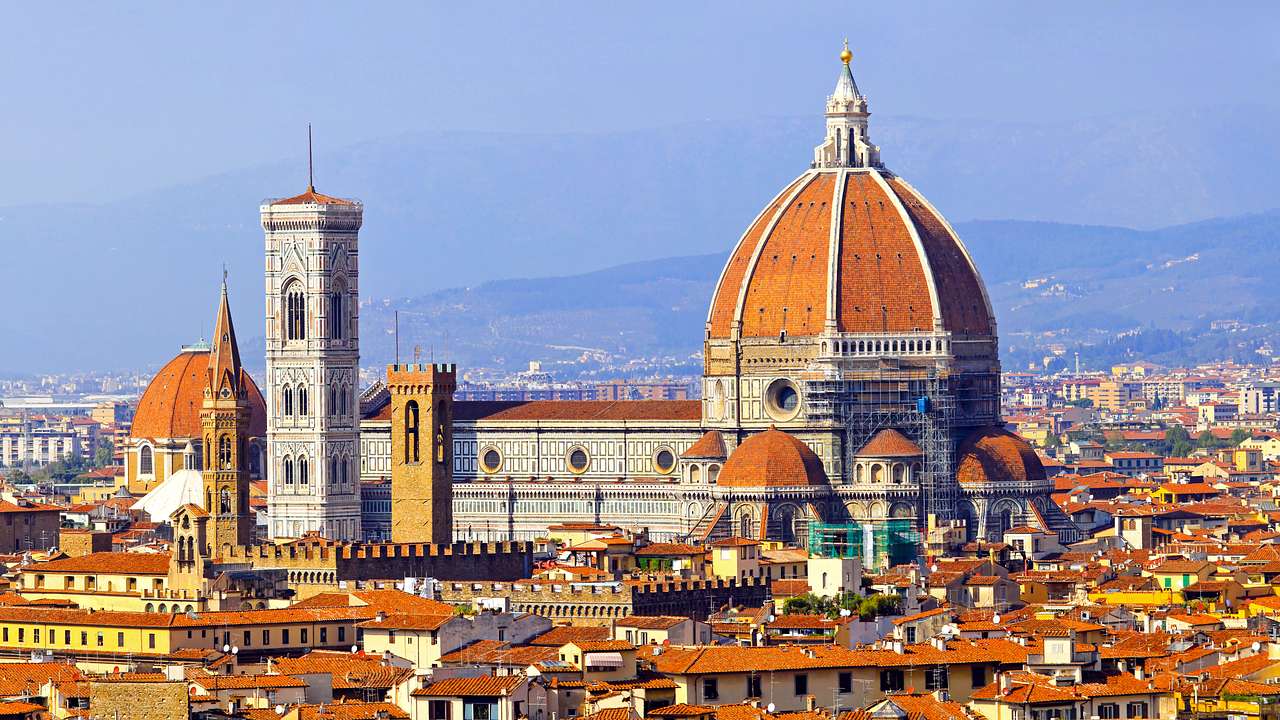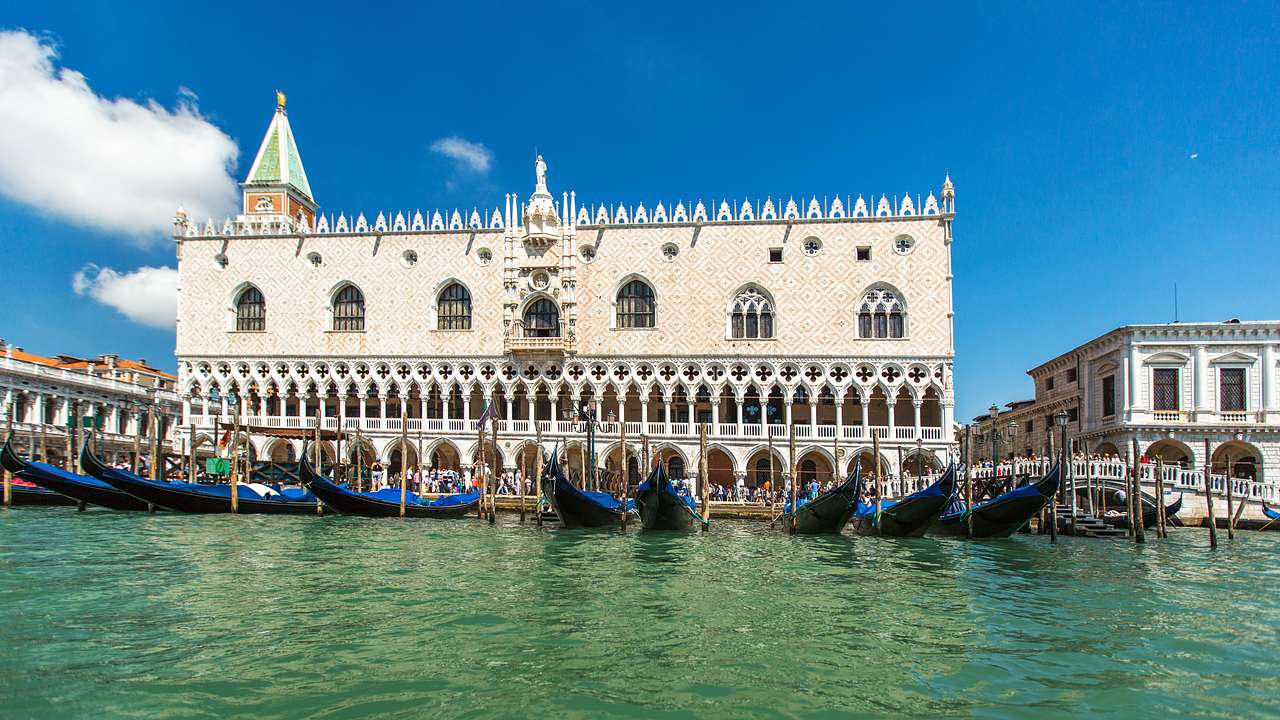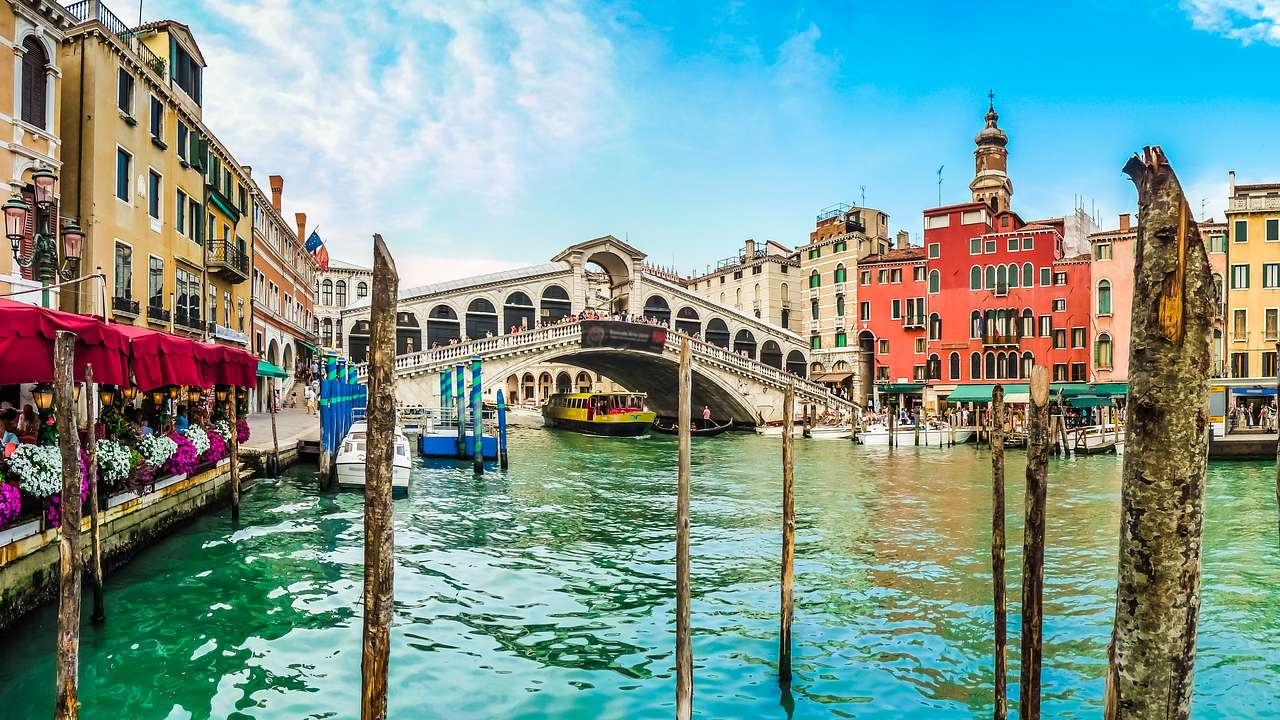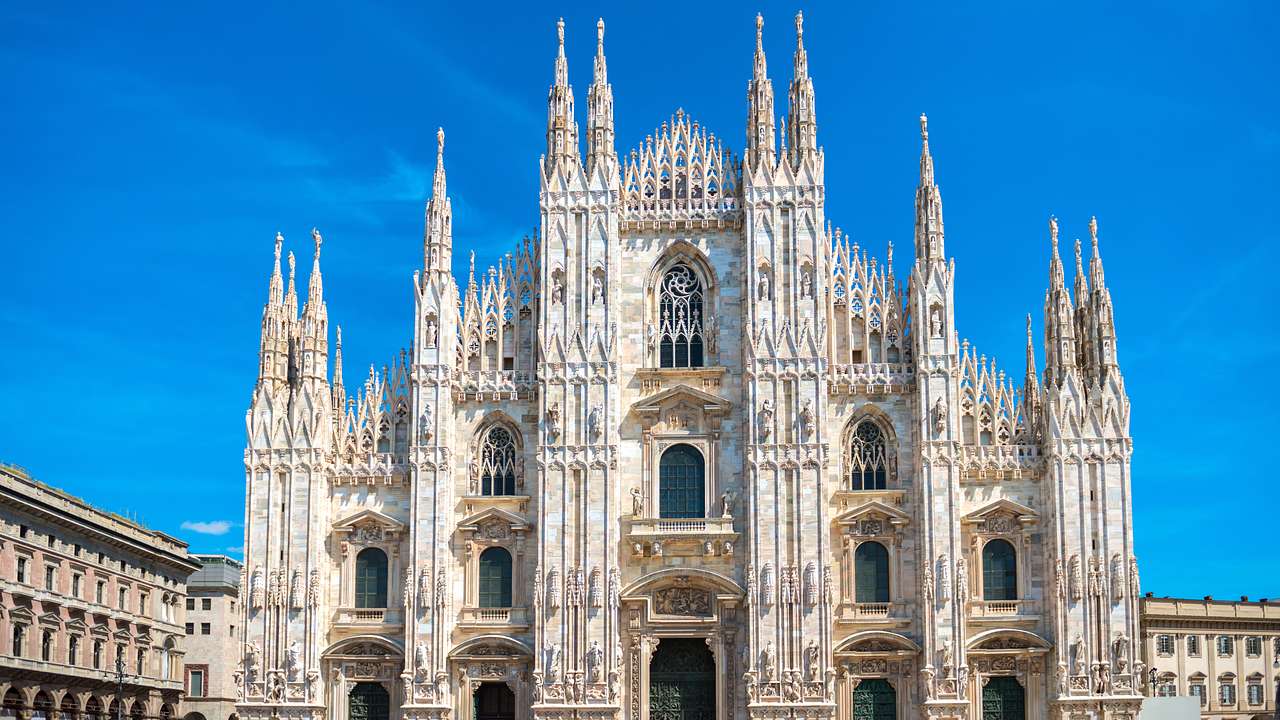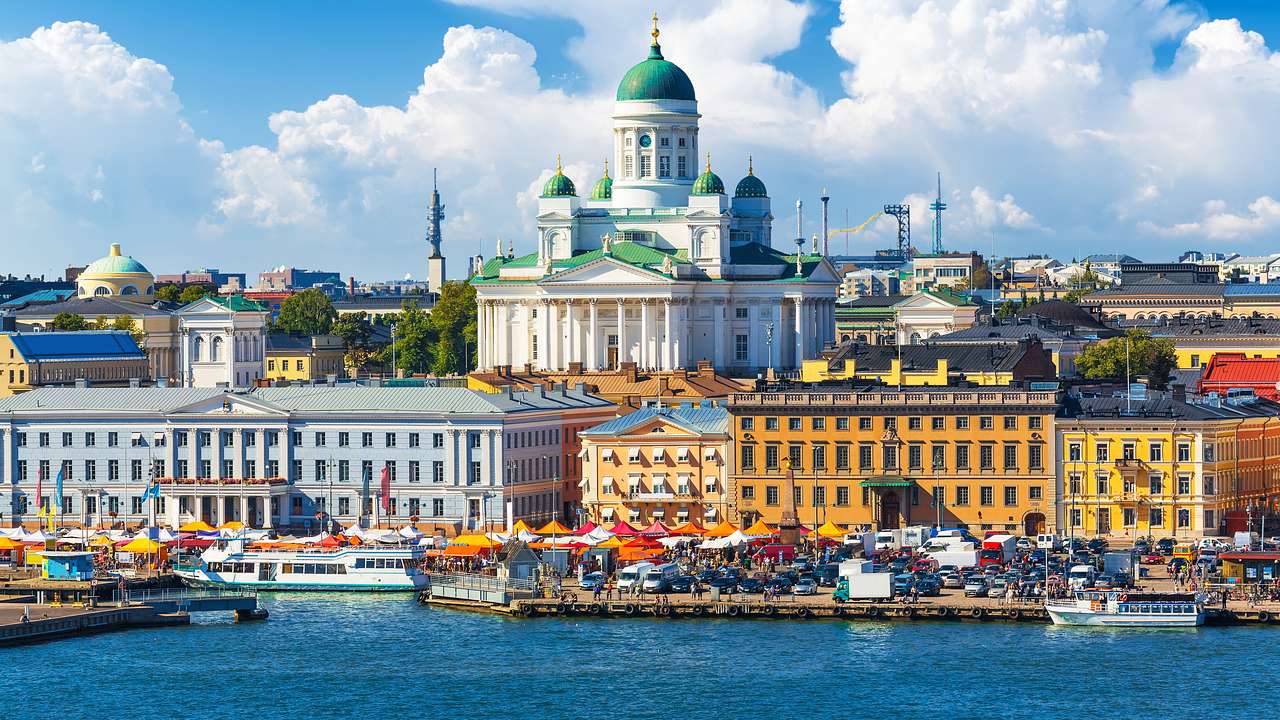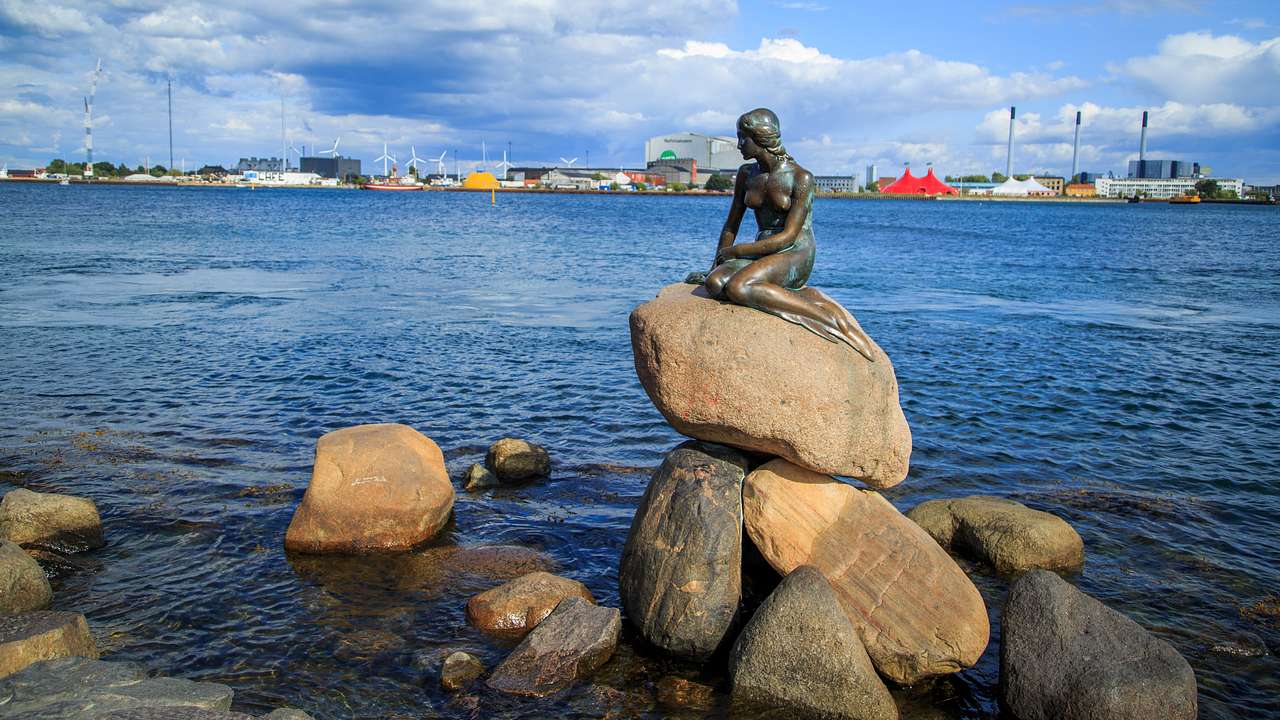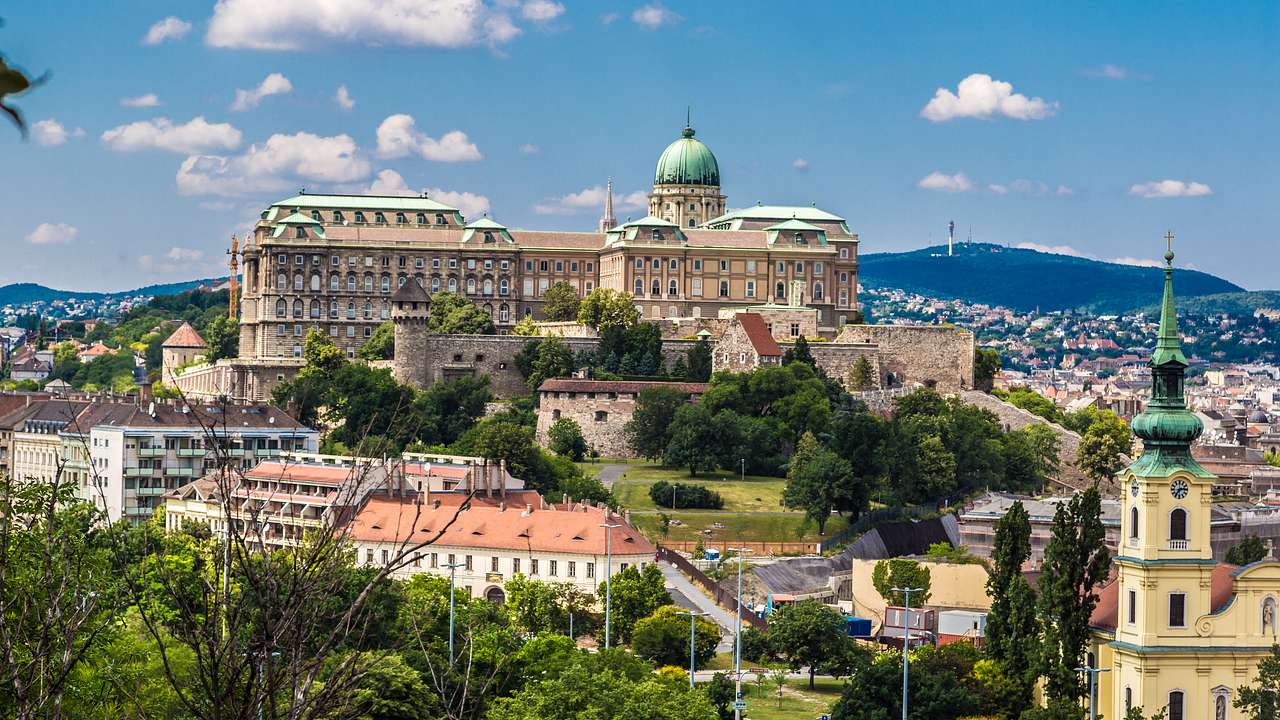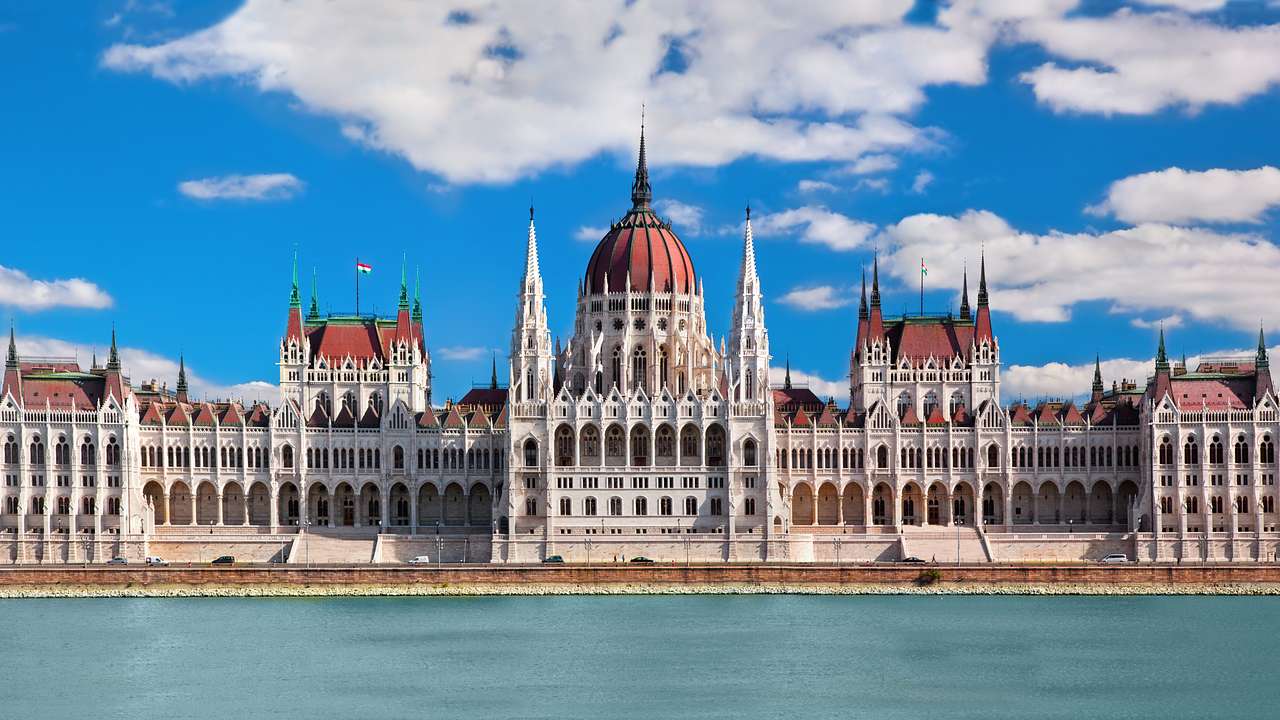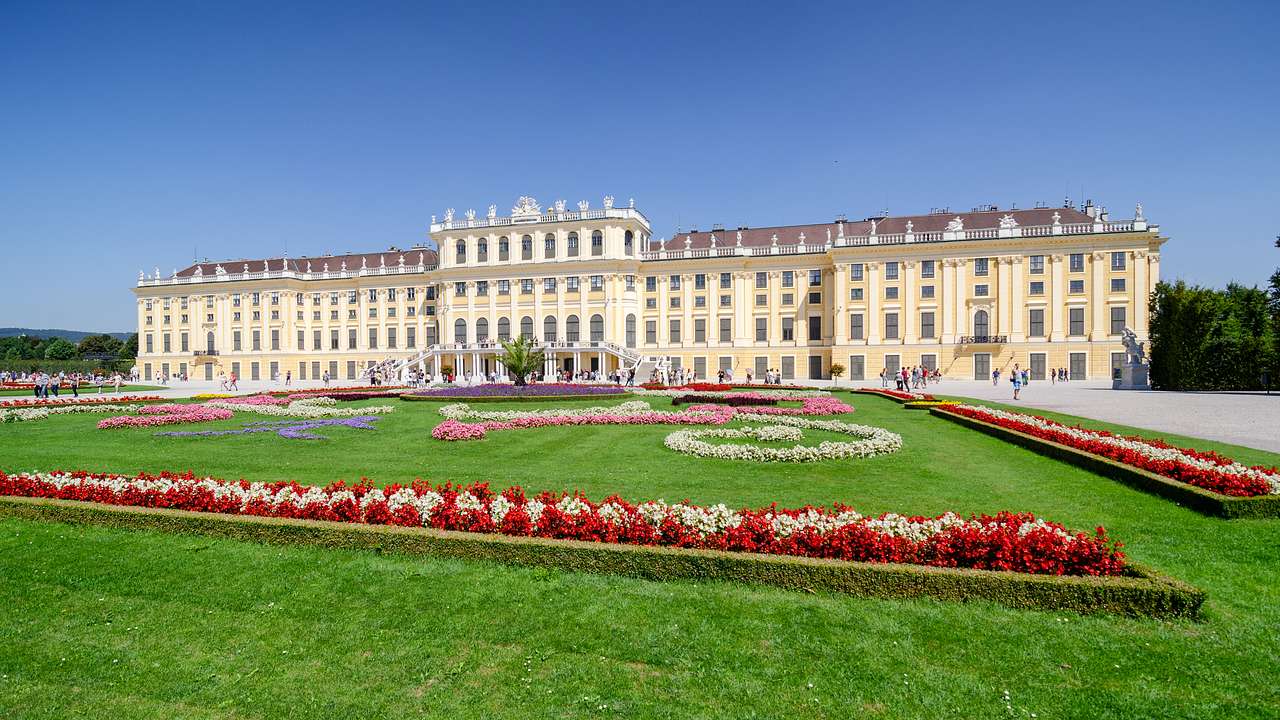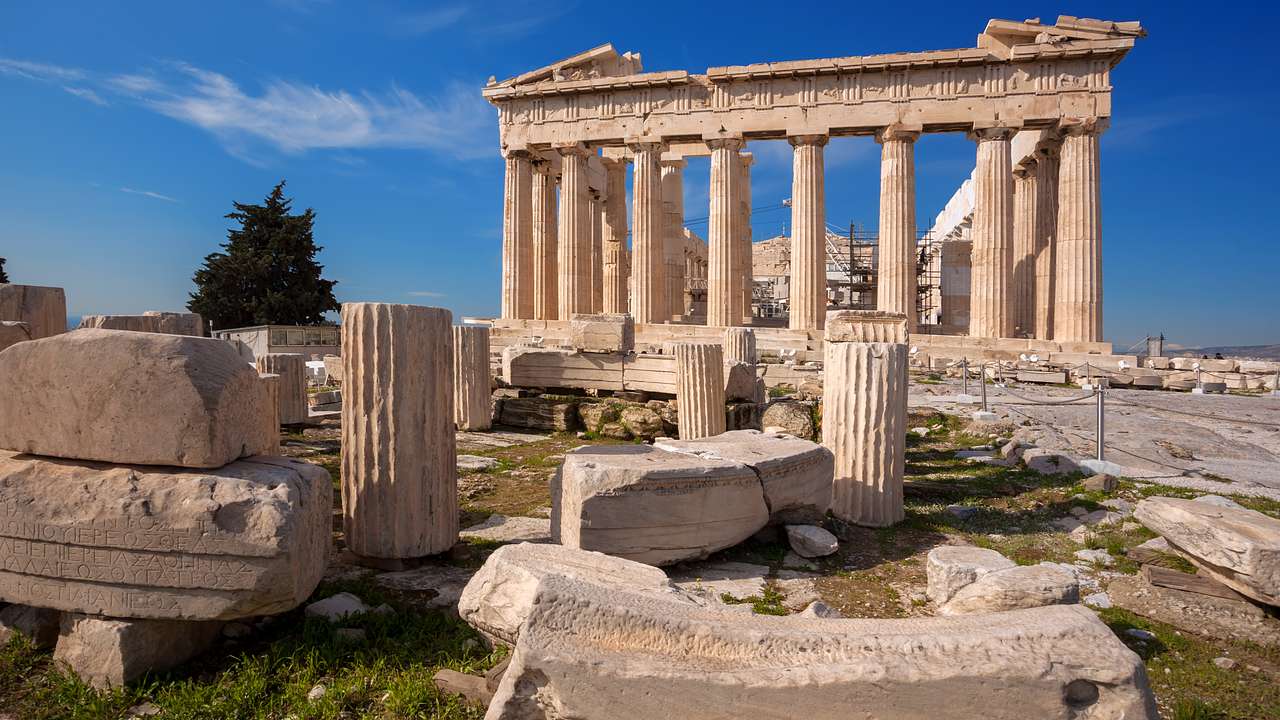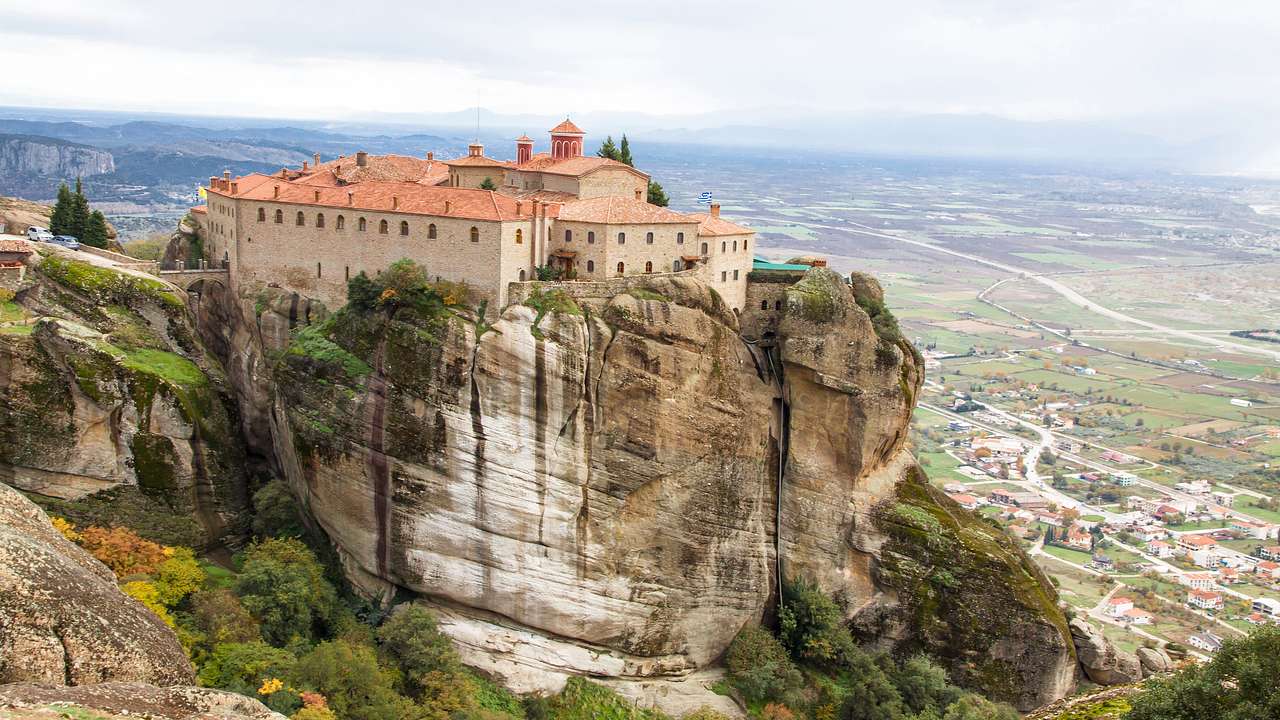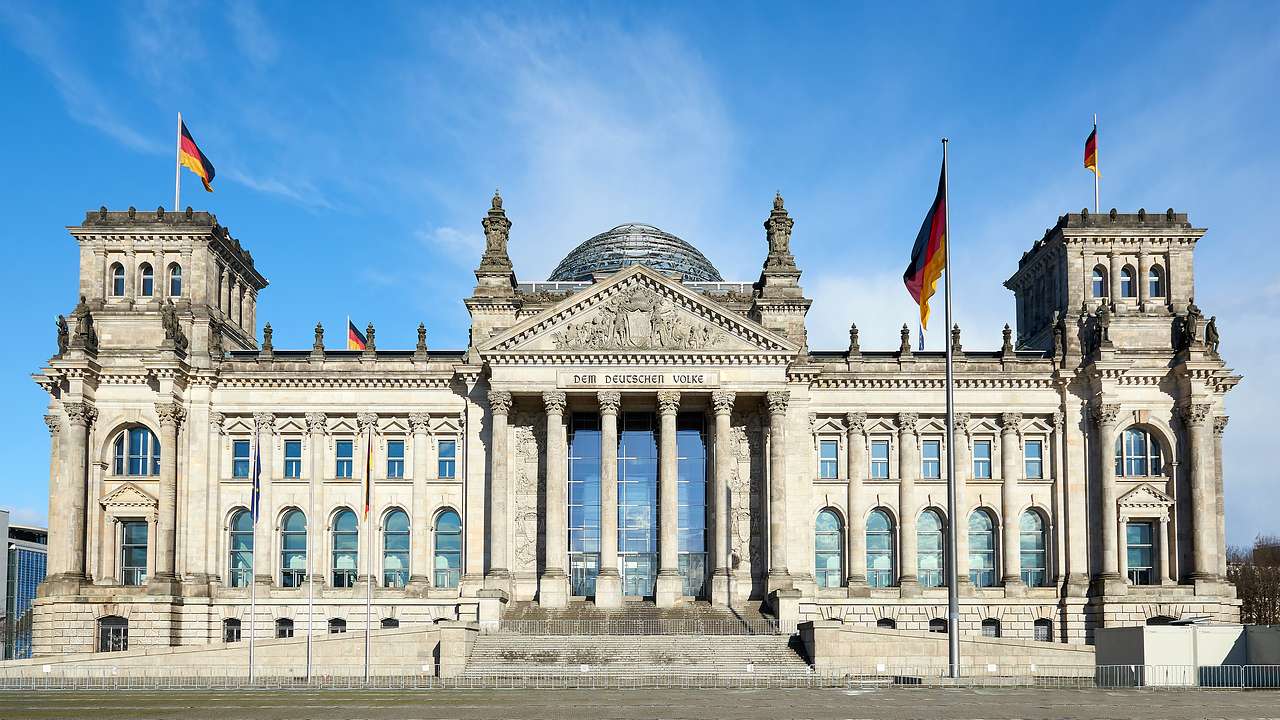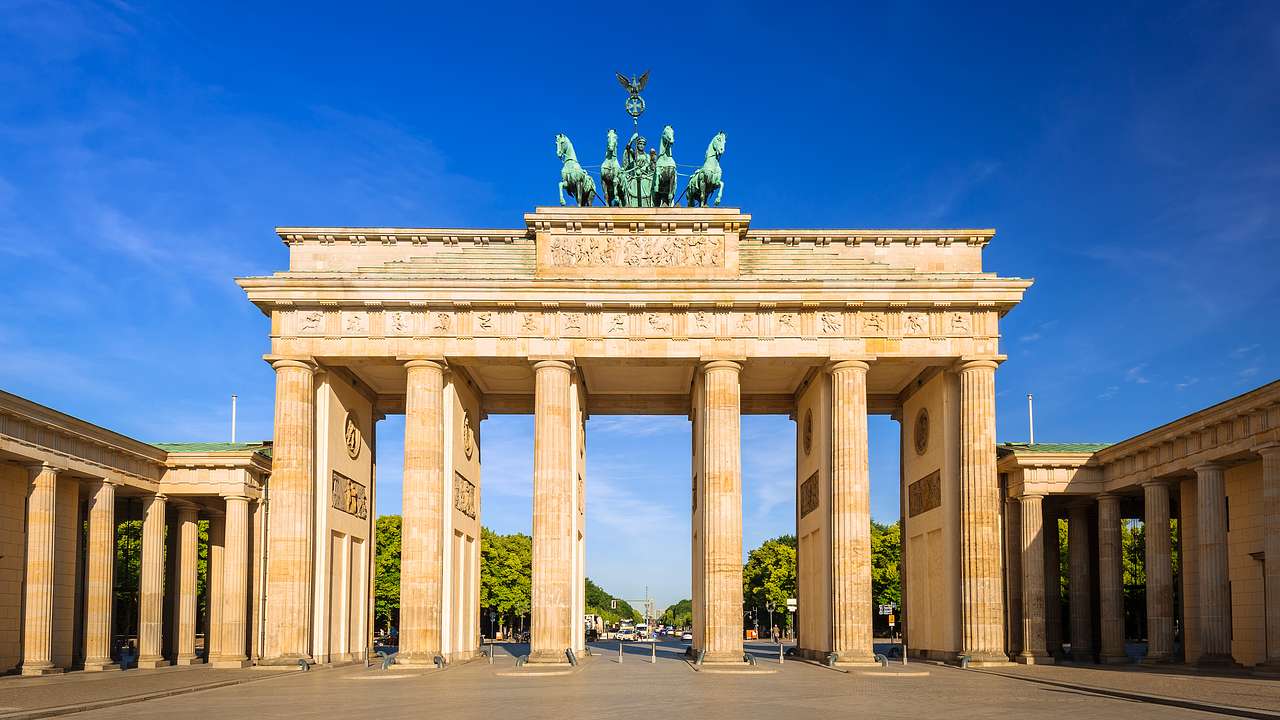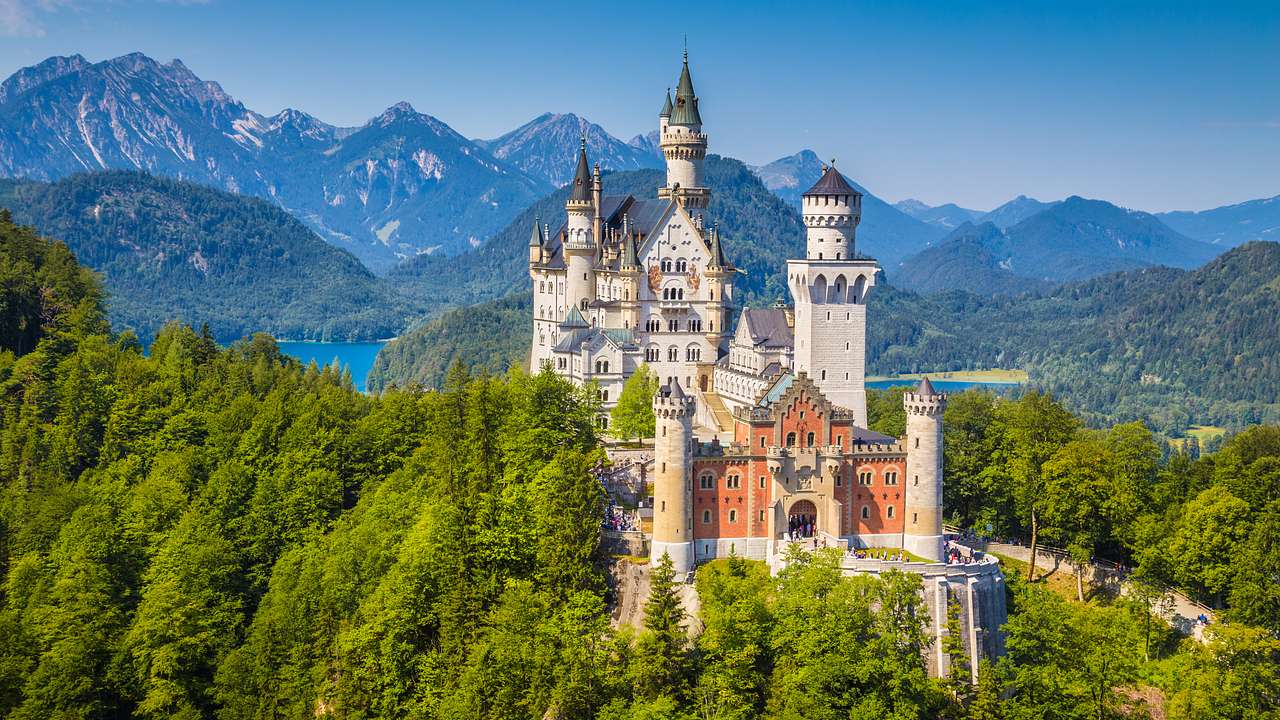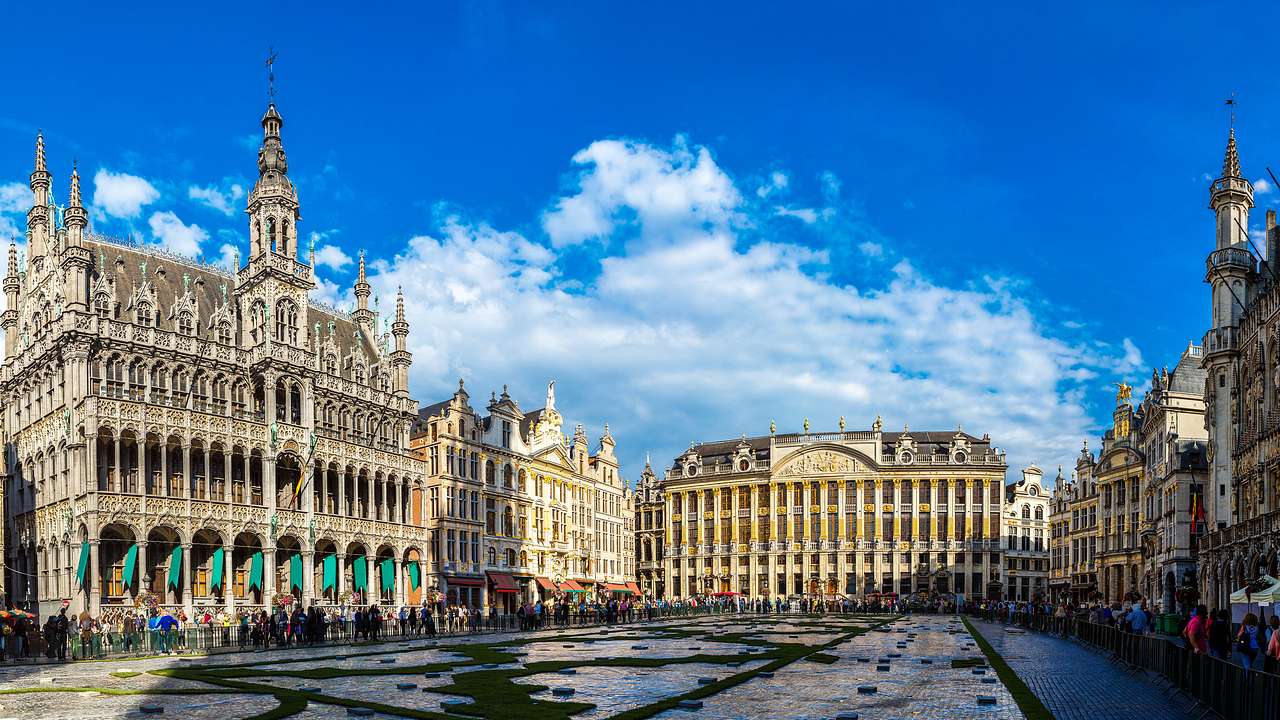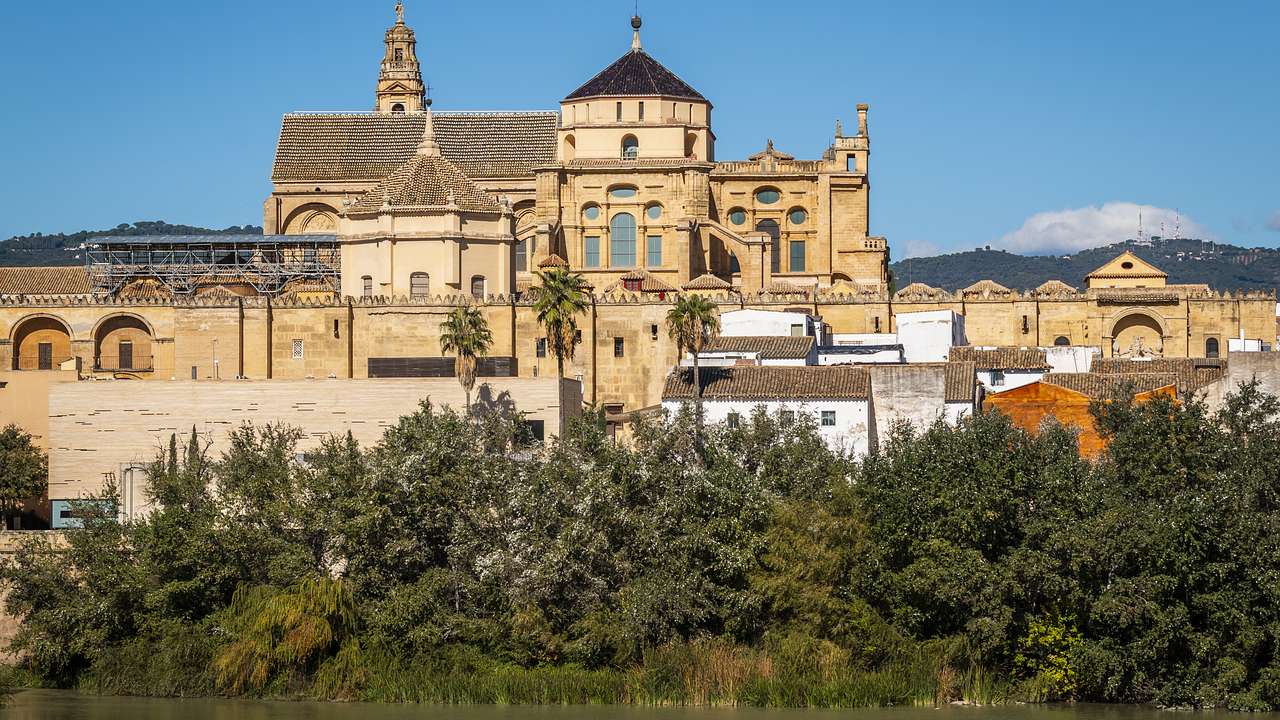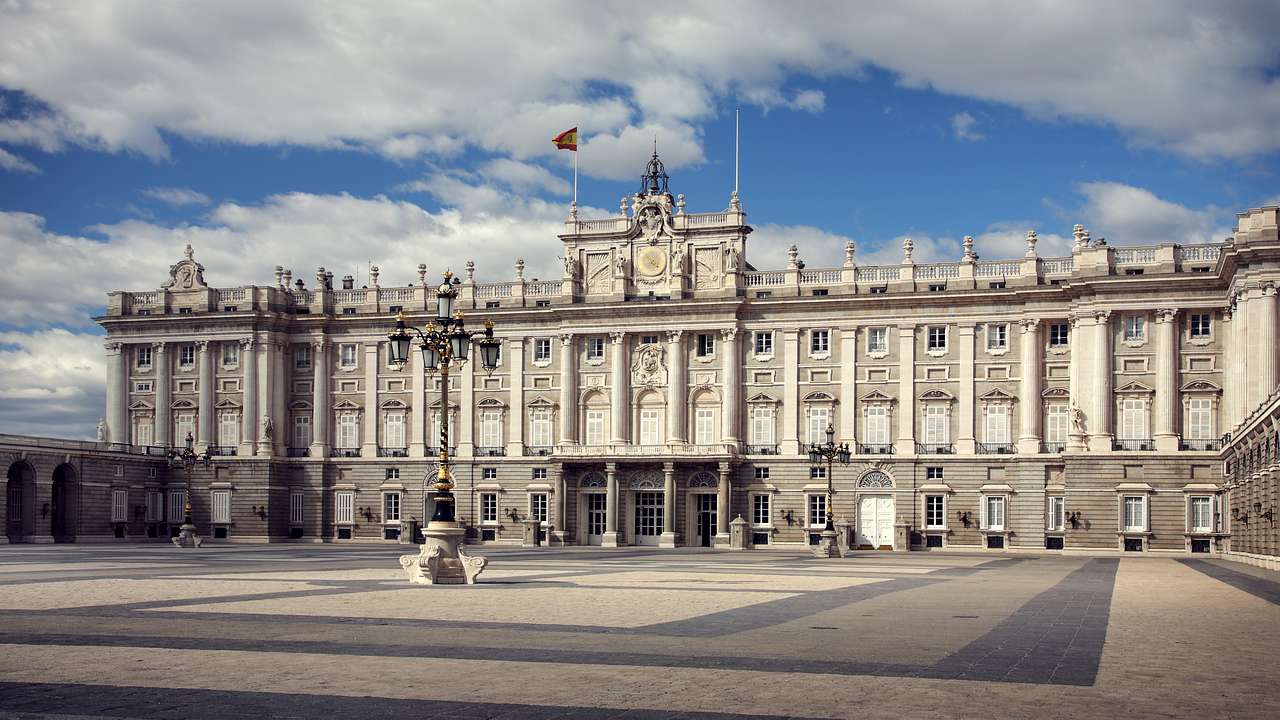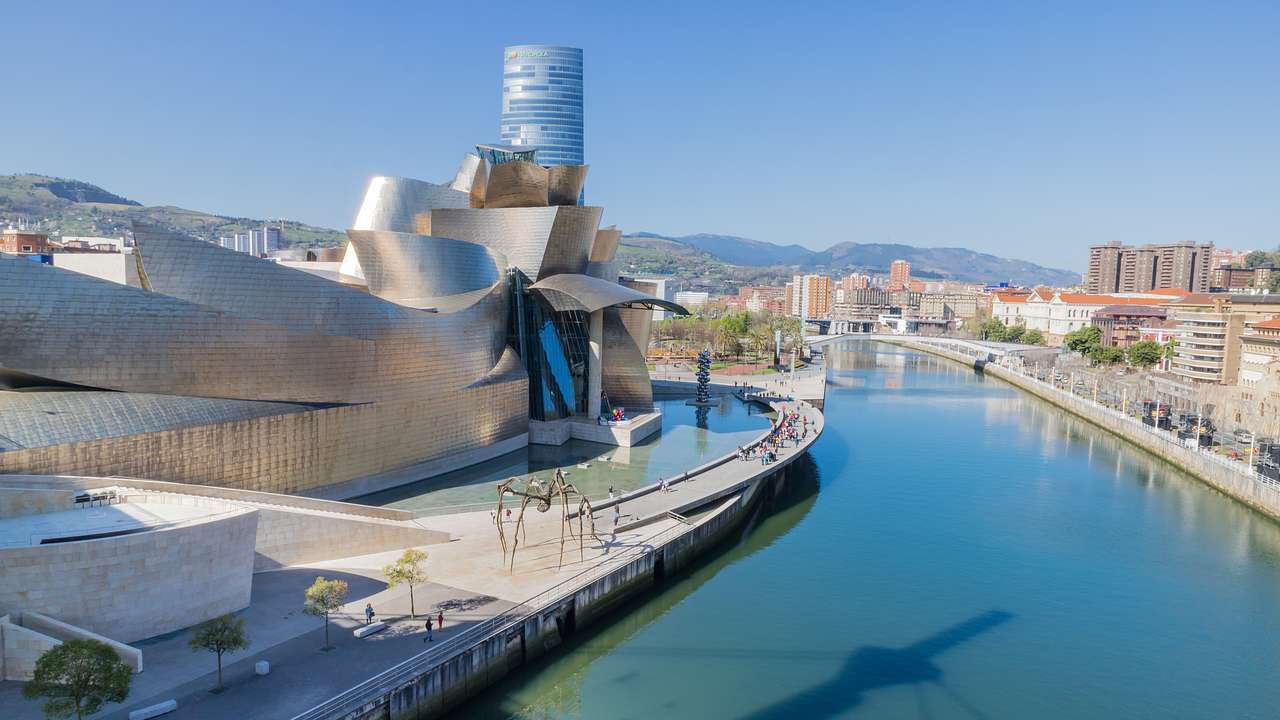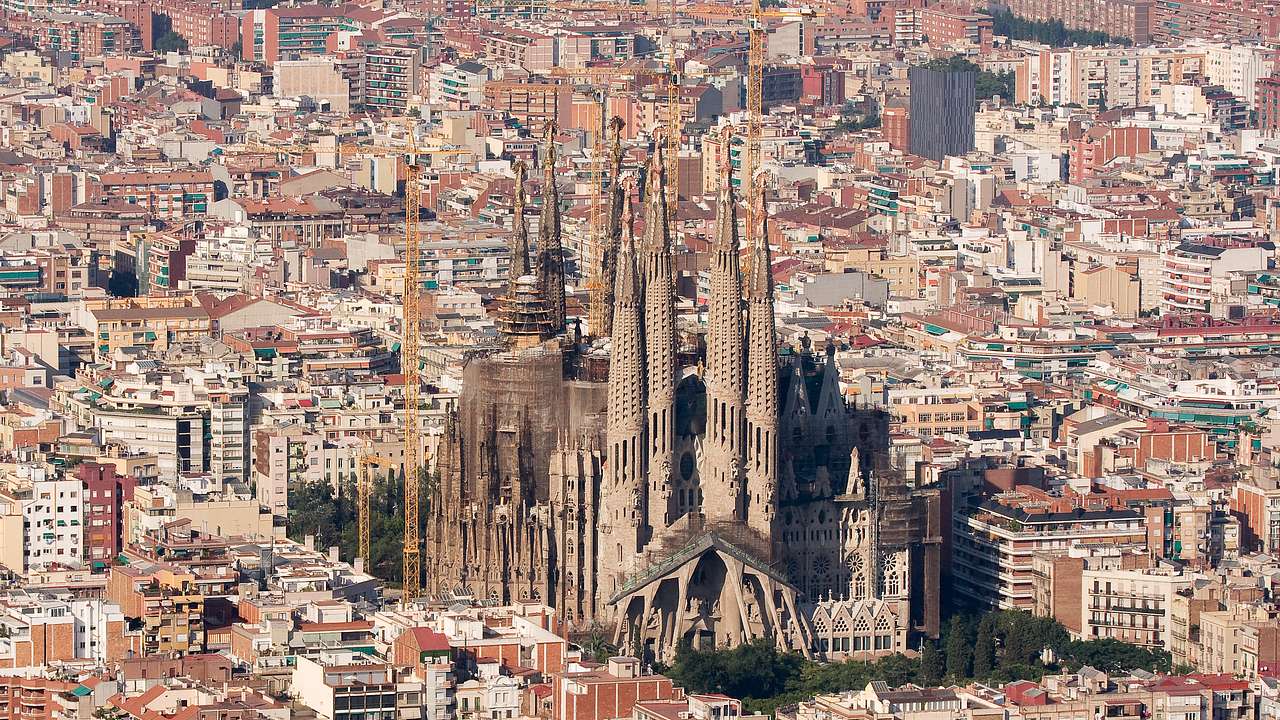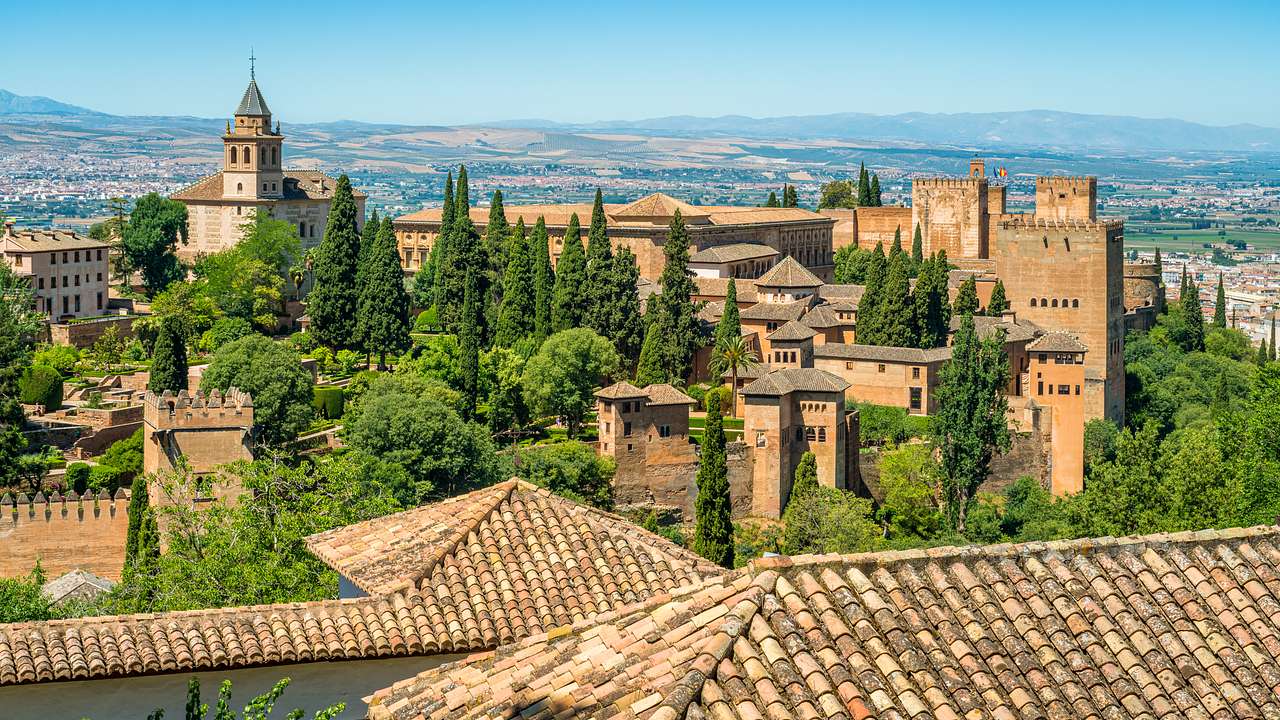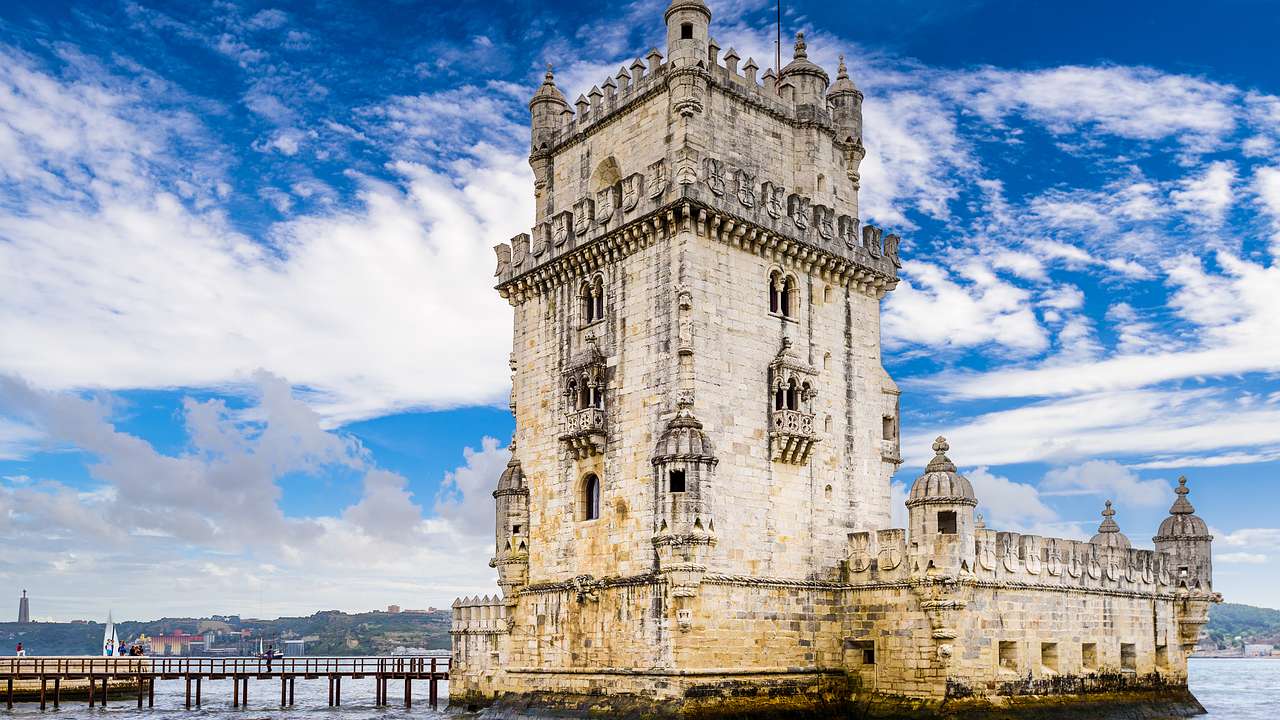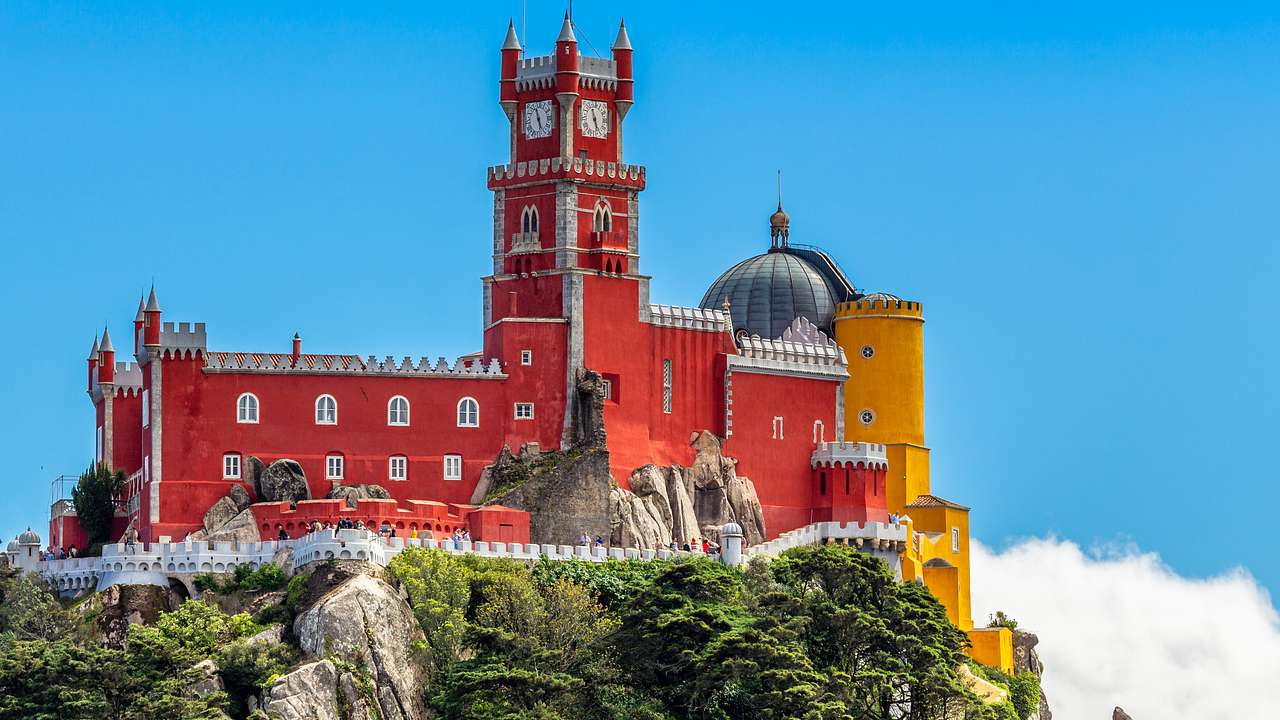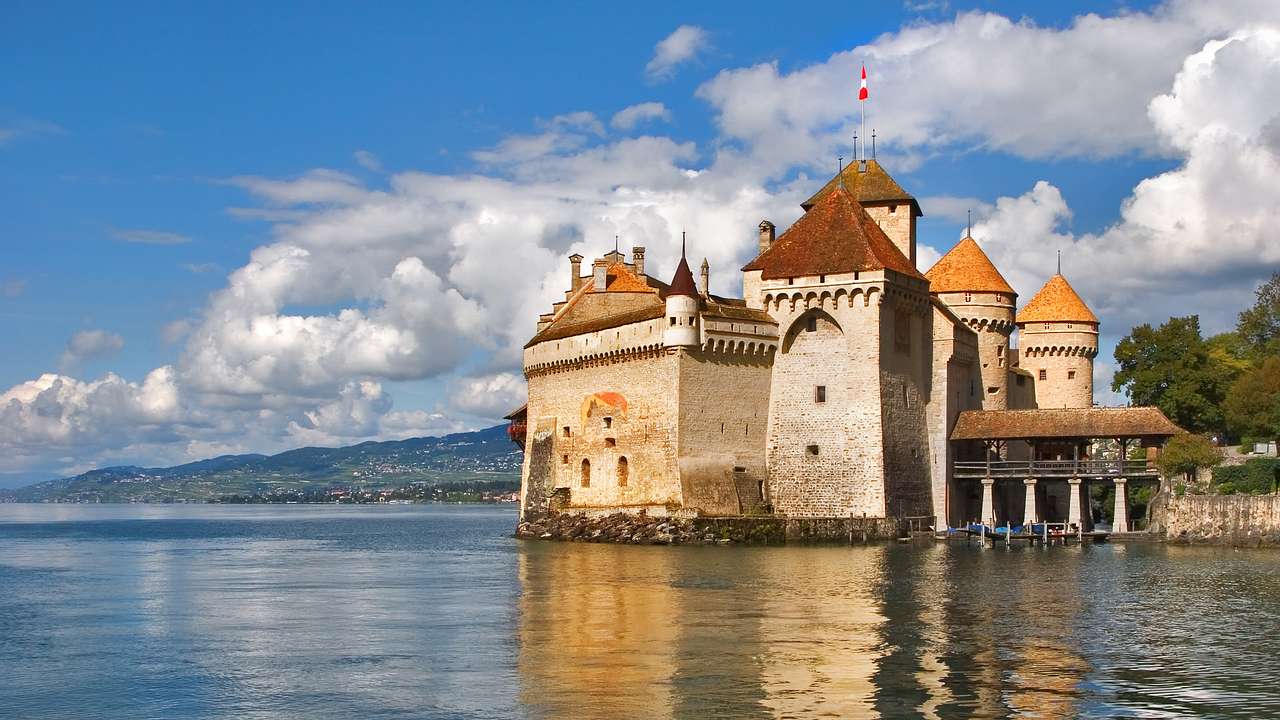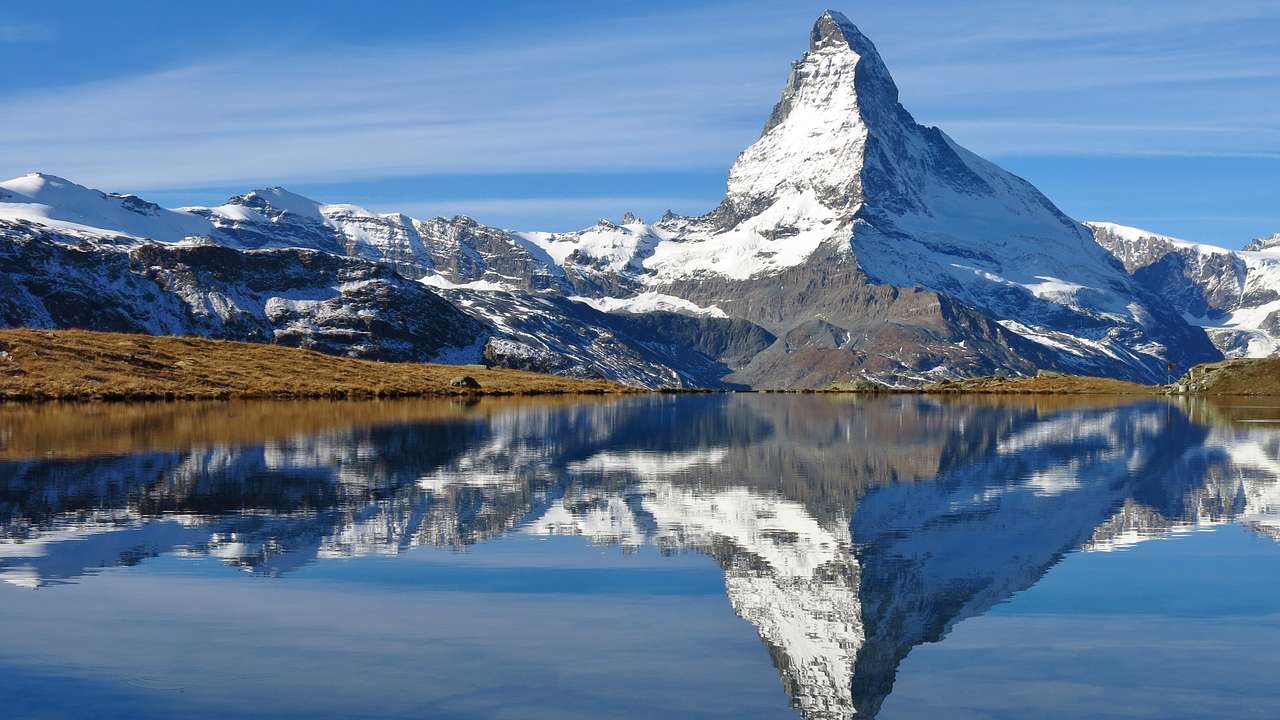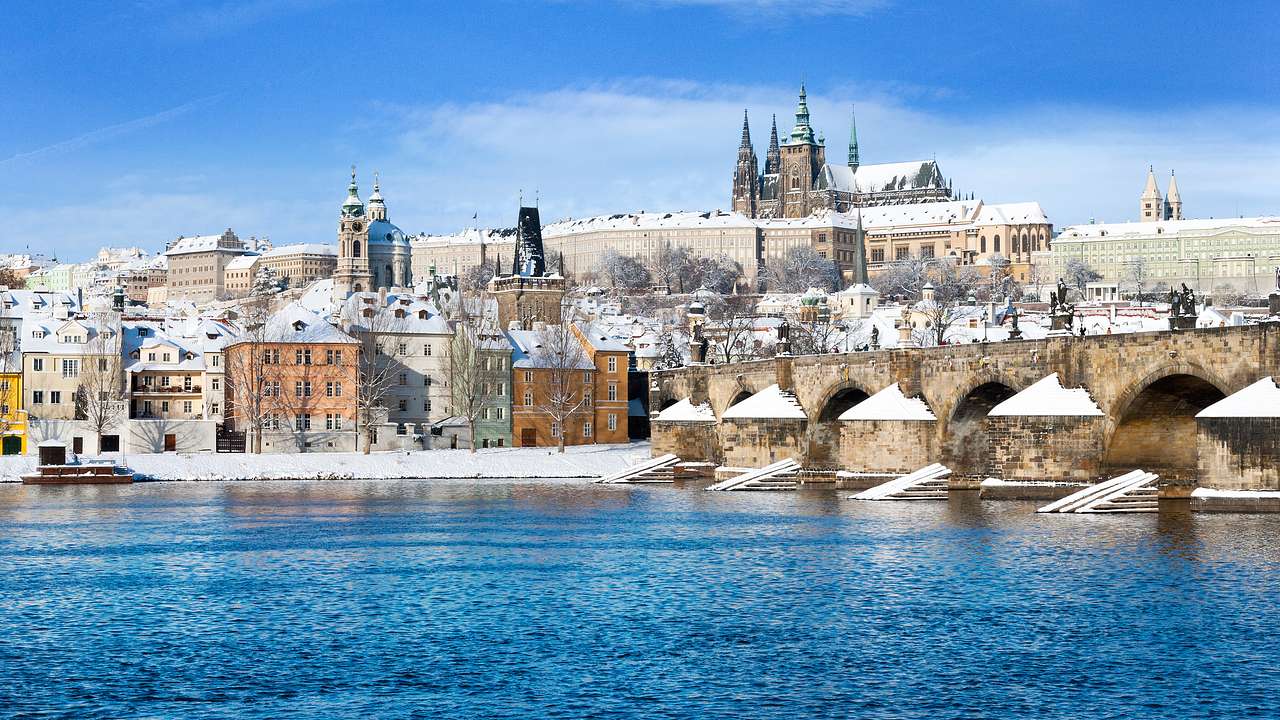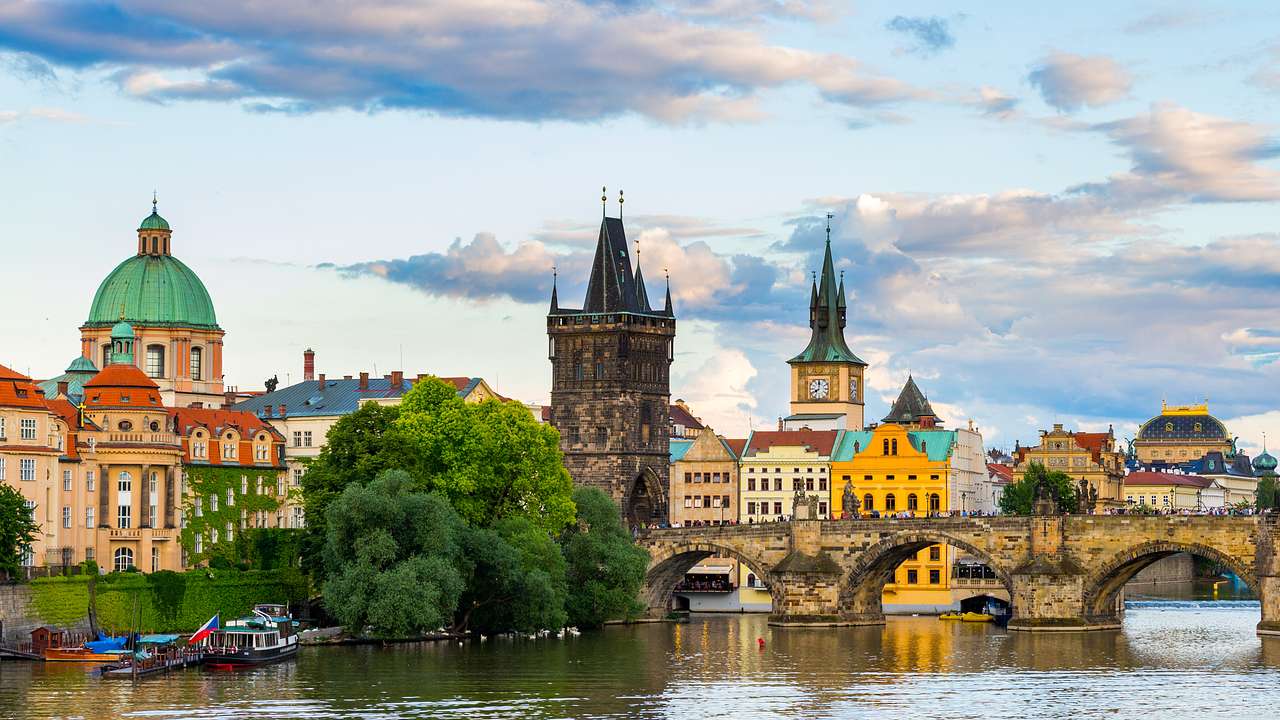46 Most Famous Landmarks in Europe You Must Visit
Destguides may receive commissions from purchases made through affiliate links in this article.
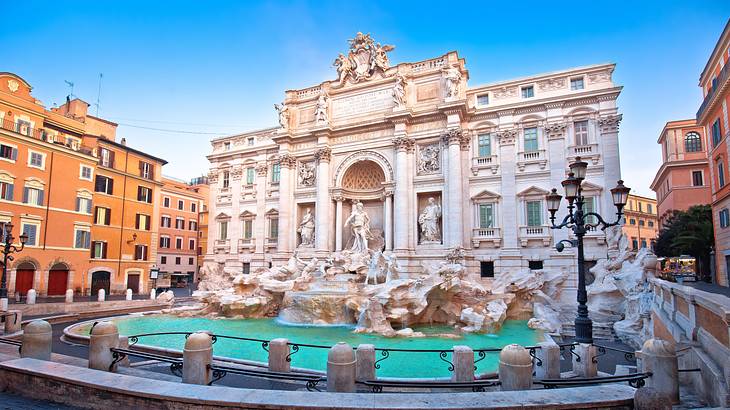
Europe is a continent comprising of 44 countries. Each country in Europe has a unique culture and history. Europe is the perfect place for a vacation, even in the winter months with limited sun.
Millions of tourists travel to Europe every year for the stunning landmarks it has to offer. Taking your time exploring a European country and its famous landmarks will result in an unforgettable experience.
If you live in a European country, you probably know a few tourist sites already. But for people living outside of the continent, and with so many landmarks in Europe to visit, knowing which places to prioritise can be challenging.
Below, you can find a comprehensive list of the most iconic European landmarks you must visit at least once in your lifetime.
46 Most Famous European Landmarks
- Notre-Dame Cathedral, Paris, France
- Louvre Museum, Paris, France
- The Eiffel Tower, Paris, France
- Arc de Triomphe, Paris, France
- Mont-Saint-Michel Abbey, Mont Saint-Michel, France
- Palace of Versailles, Versailles, France
- Big Ben, London, United Kingdom
- Palace of Westminster, London, United Kingdom
- Buckingham Palace, London, United Kingdom
- Stonehenge, Wiltshire, United Kingdom
- Kyiv Pechersk Lavra, Kyiv, Ukraine
- Saint John's Co-Cathedral, Valletta, Malta
- St Patrick's Cathedral, Dublin, Ireland
- St. Peter's Basilica, Vatican City
- Apostolic Palace, Vatican City
- The Sistine Chapel, Vatican City
- Pantheon, Rome, Italy
- Trevi Fountain, Rome, Italy
- Colosseum, Rome, Italy
- Leaning Tower of Pisa, Pisa, Italy
- Florence Cathedral, Florence, Italy
- Doge's Palace, Venice, Italy
- Rialto Bridge, Venice, Italy
- The Duomo, Milan, Italy
- Helsinki Cathedral, Helsinki, Finland
- Little Mermaid Statue, Copenhagen, Denmark
- Buda Castle, Budapest, Hungary
- Hungarian Parliament Building, Budapest, Hungary
- Schönbrunn Palace, Vienna, Austria
- Acropolis, Athens, Greece
- Meteora, Kalabaka, Greece
- Reichstag Building, Berlin, Germany
- Brandenburg Gate, Berlin, Germany
- Neuschwanstein Castle, Bavaria, Germany
- Grand Place, Brussels, Belgium
- Mosque-Cathedral of Cordoba, Cordoba, Spain
- Royal Palace of Madrid, Madrid, Spain
- Guggenheim Museum, Bilbao, Spain
- Basilica of the Sagrada Familia, Barcelona, Spain
- Alhambra Palace, Granada, Spain
- Belém Tower, Lisbon, Portugal
- Pena Palace, Sintra, Portugal
- Chateau de Chillon, Veytaux, Switzerland
- Matterhorn, Zermatt, Switzerland
- Prague Castle, Prague, Czech Republic
- Charles Bridge, Prague, Czech Republic
Europe Landmarks Video
Check out our highlights video of Europe landmarks.
Europe Landmarks Map
A map of Europe landmarks. Use the map to explore all of the points of interest.
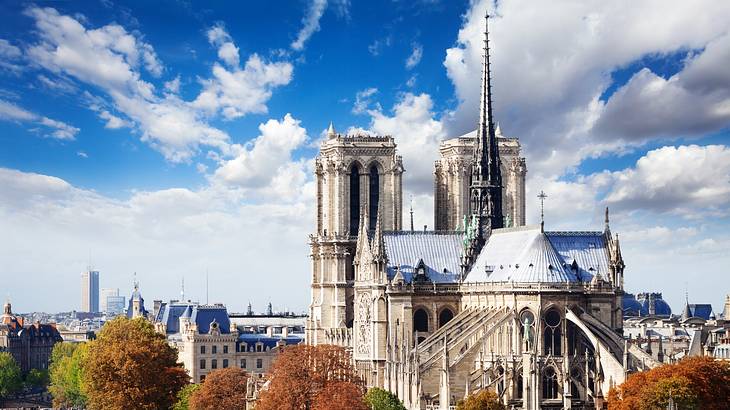
Notre-Dame Cathedral, Paris, France
Paris, usually referred to as the city of love, is one of the most visited cities in Europe. There are so many famous European landmarks in Paris that you can easily fill a 4-day Paris itinerary. One of the prominent Paris landmarks is, of course, the Notre-Dame Cathedral.
This cathedral is one of the largest catholic churches in the world. Its construction was completed in 1345, which took over 180 years. The exterior of the cathedral is quite impressive as it has unique French Gothic architecture.
One fantastic thing about Notre-Dame is that it is free to enter. Audio guides are available to rent for a reasonable fee at the entrance, or you can join a tour.
Notre-Dame is full of interesting sculptures and ancient relics. You can climb its 387 steps to see bells and gargoyles at the top of the cathedral if you'd like as well.
🏨 Accommodations in close proximity to Cathédrale Notre-Dame de Paris
- Hôtel Vinci Due & Spa (highly acclaimed)
- Novotel Paris Gare de Lyon (take it easy by the pool)
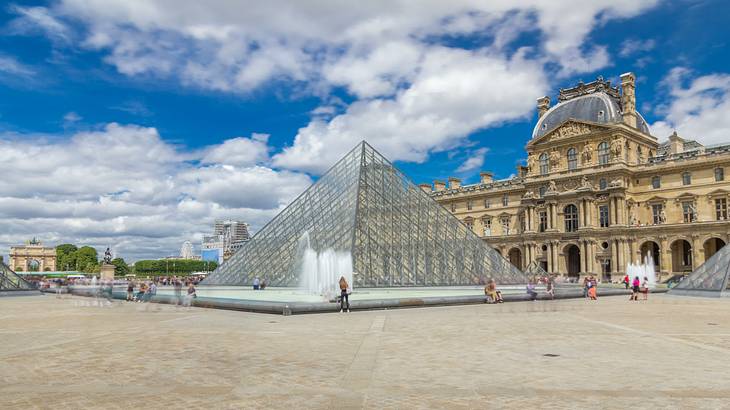
Louvre Museum, Paris, France
Naturally, tourists are enticed to museums. Located in Paris, France, the Louvre is the world's largest art museum.
Many tourists are lured to The Louvre because of its contemporary glass nature and pyramid design. The Louvre Museum remains the home of the world-famous painting, the Mona Lisa.
Aside from the Mona Lisa painting, the museum exhibits over 30,000 paintings and sculptures from the 7th to 19th centuries.
Why should you visit the Louvre, you ask? To begin with, the pyramid of the Louvre is just the entrance, so imagine what the whole museum has to offer! Visiting the museum in the afternoon is recommended because crowds usually flood the place during the day.
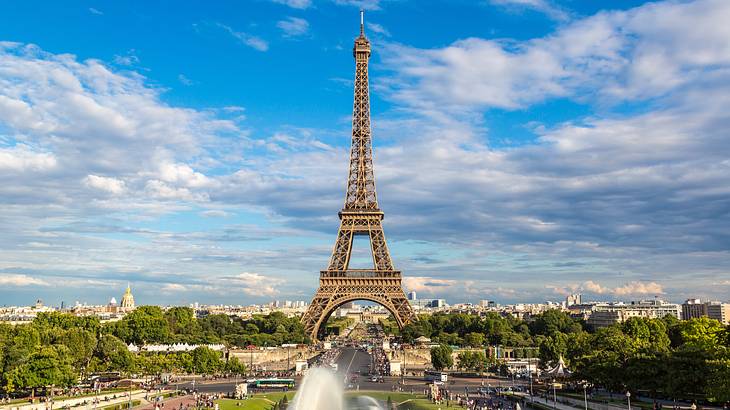
The Eiffel Tower, Paris, France
The Eiffel Tower is undoubtedly one of the most prominent landmarks in the world, easily making it one of the top landmarks in Europe. It is located in Paris, France, and is 4 km away from the city's centre.
The tower's design is by Gustave Eiffel, a civil engineer and architect by profession. This landmark attracts more than 5 million people every year.
Construction of the Eiffel Tower was completed in March 1889, making it the tallest building at that time. After 41 years of being the tallest human-made building in the world, the title was handed over to the Chrysler Building located in New York.
The Eiffel Tower is a popular romantic spot for couples. Visiting the Eiffel Tower at night sparks a certain romantic mood between couples that makes the moment and trip to Paris memorable.
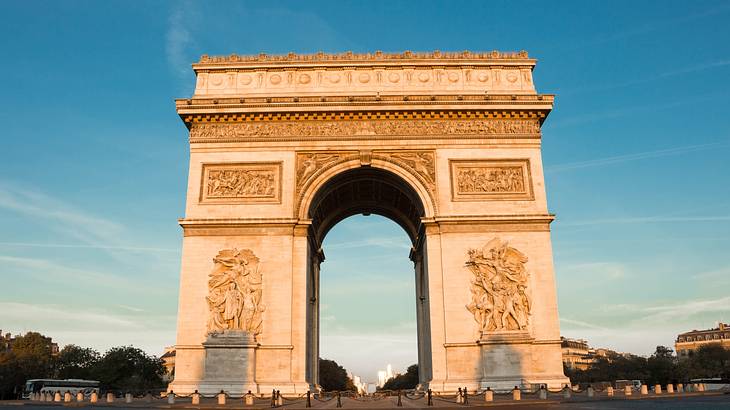
Arc de Triomphe, Paris, France
Another must-visit landmark in Europe is the famous Arc de Triomphe in Paris, France. The construction of the landmark started in August 1806 and ended in July 1836, making it 30 years in total.
The Arc de Triomphe honours the brave soldiers who died for France in the French Revolution. The names of these people are inscribed on the walls of the monument to commemorate their sacrifice.
You can climb to the Arch's highest point to enjoy the view and visit the museum inside. At the top, you are capable of seeing the whole city. The only problem is that you have to climb a staircase of 234 steps to enjoy the view, but this should not be the reason why you let this moment pass you by!
🏨 Accommodations close to Arc de Triomphe
- Hotel le 37 Bis (rated 4-stars)
- Hôtel Paris Neuilly
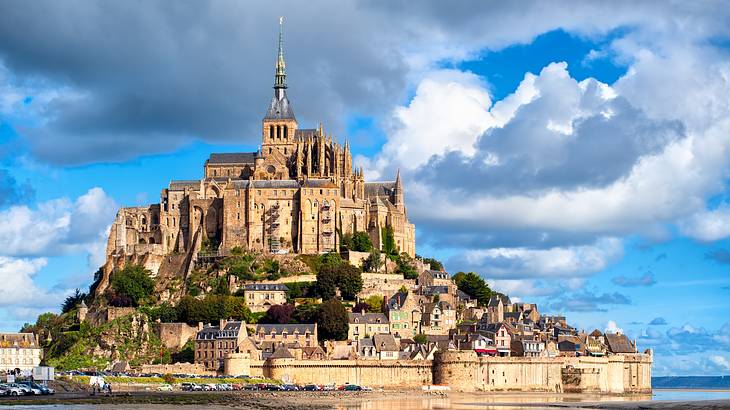
Mont-Saint-Michel Abbey, Mont Saint-Michel, France
Another landmark popular in Europe, especially in France, is Mont-Saint-Michel Abbey. As the name suggests, it is an abbey located within Mont Saint-Michel's island, in the department of Manche. The construction of the abbey was completed in 1523 with a Gothic architectural style.
When you are in France, and if you have the opportunity to explore the abbey, take it because it will not disappoint. The view from the abbey at every point is also incredible!
🏨 Place to stay near Mont Saint-Michel
- Mercure Mont Saint Michel (4-star rating)
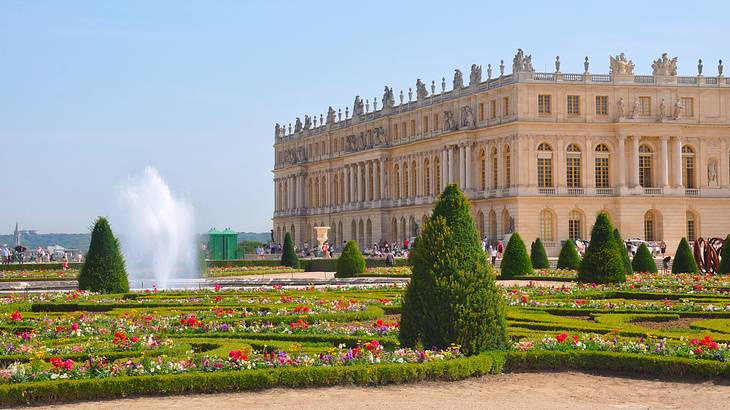
Palace of Versailles, Versailles, France
Another famous landmark in France is the Palace of Versailles. The Palace of Versailles, located in the region of Île-de-France, served as the residence for the royal family from 1682 under Louis XIV.
The Palace is about 20 kilometres away from the centre of Paris. It was initially a hunting lodge before it was transformed into a palace, starting in 1631 and completed in 1634.
With over 600 rooms, the Palace of Versailles has a lot to offer visitors. You are provided with the option to either use an audio guide or do a self-tour.
There is usually no admission fee between November to March, which is appealing for budget-conscious travellers or those who are visiting at that time.
🏨 Accommodations close to Palace of Versailles
- Waldorf Astoria Versailles - Trianon Palace (5-star rating)
- Appartements - le Logis Versaillais (rated 4-stars)
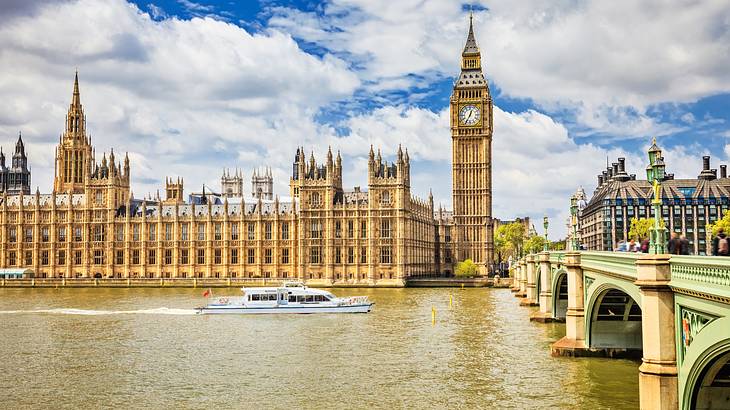
Big Ben, London, United Kingdom
Big Ben, formerly known as the Great Bell, can be found at the north end of the Palace of Westminster. It is the third-largest, free-standing clock tower in the world, and it also rings at the top of every hour.
Construction of Big Ben started on September 28, 1843, and was completed in 1856. As Big Ben is an iconic monument in London, England, it makes it easily one of the most famous places in Europe.
When you travel to London for 4 days, visiting Big Ben allows you to learn about the history of the city. The tower became a symbol of hope during the second world war. Although seeing this famous British landmark during the day can be impressive, coming at night or during the holidays can leave an even better impression.
🏨 Places to stay near Big Ben
- CitizenM Tower of London (scored highly by guests)
- Montcalm East (5-star rating)
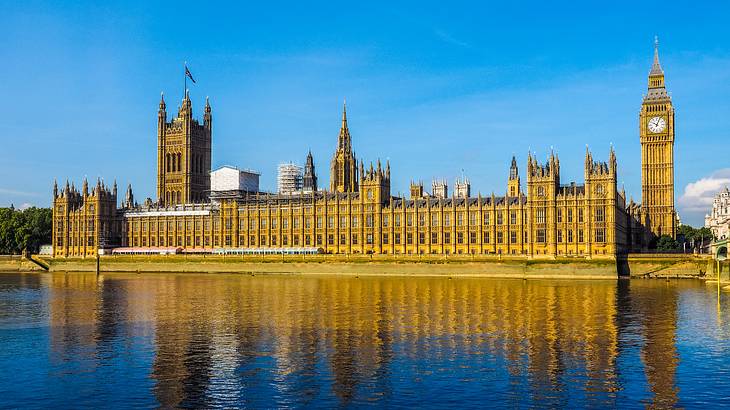
Palace of Westminster, London, United Kingdom
The Palace of Westminster is the official name of the Houses of Parliament in London, United Kingdom. It is called the Houses of Parliament because there are two 'houses' within it.
The two houses are the House of Lords and the House of Commons, and their meeting place is the Palace of Westminster. It was built in 1847 with 1,200 rooms and 11 courtrooms in total.
The original building was constructed in 1834 but was destroyed by fire, with the Chapel of St. Mary Undercroft surviving. One important thing to note is that the palace is open to visitors on Saturdays only or during July and August.
If you are in the UK and you love politics or debates, the Palace of Westminster must be included on your London bucket list.
London, and the UK in general, has a lot more to offer tourists. If you are visiting this famous European city, consider also making a day trip to Oxford or Cambridge from London, or head to York for a couple of days if you're in England for longer.
🏨 Stay in close proximity to Palace of Westminster
- CitizenM London Victoria Station (very highly rated)
- Motel One London-Tower Hill
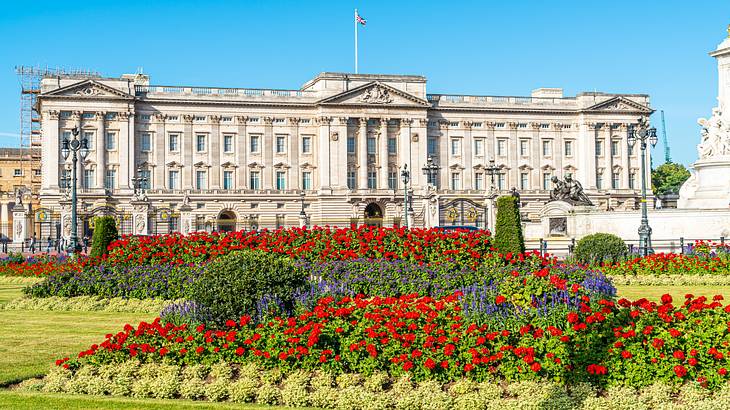
Buckingham Palace, London, United Kingdom
Buckingham Palace is located in London, United Kingdom. The Palace has served as the residence for many sovereigns, dating back from 1837 to the present day. The first sovereign to occupy Buckingham Palace was Queen Victoria.
There are several reasons why you should visit Buckingham Palace when you are in London for a weekend. One top sight to look out for at Buckingham Palace is the "Changing of the Guard" ceremony that occurs once a day.
You also have the opportunity to explore the royal garden, which covers 39 acres.
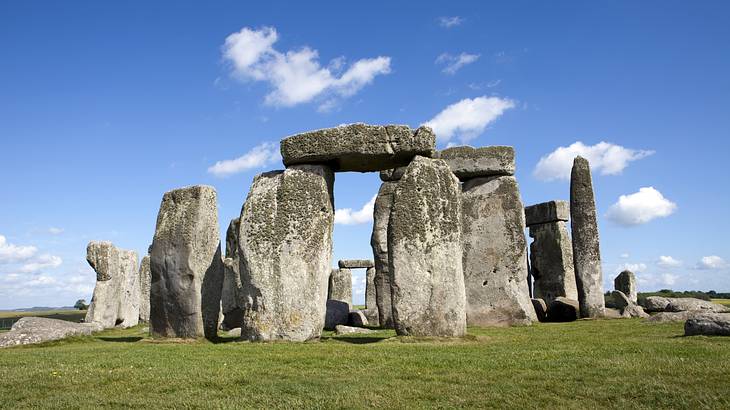
Stonehenge, Wiltshire, United Kingdom
Stonehenge is a prehistoric monument found in the Amesbury area of Wiltshire in the United Kingdom. This UNESCO World Heritage Site is believed to have been constructed between 3000 and 2000 BC.
The England landmark is formed of large stones which are arranged in a ring. The site was initially used as a burial place. Today, it is one of the most recognisable and famous landmarks of Europe.
Visitors will be able to view the monument and have access to a museum and visitors centre. There is an audio guide available too for those who want to learn more about the history of the site. Doing so is likely to make your visit a more enjoyable and memorable experience.
🏨 Stay nearby Stonehenge
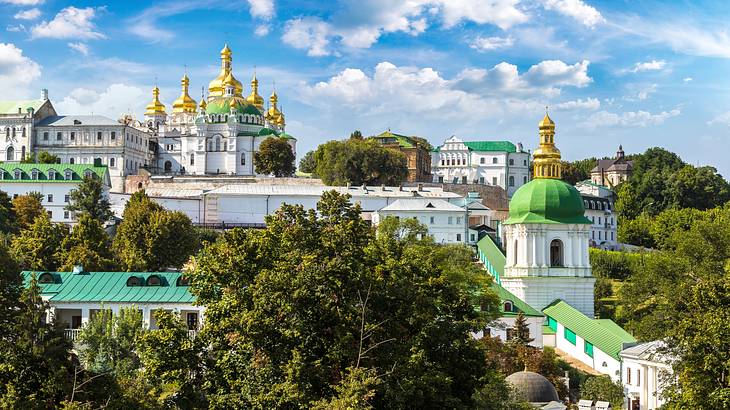
Kyiv Pechersk Lavra, Kyiv, Ukraine
Kyiv Pechersk Lavra, also known as the Kyiv Monastery of the Caves, is an Orthodox monastery built by monks in 1051. This landmark is known as one of the holiest places in Kyiv, Ukraine.
The monastery is designed in a striking Baroque style. The complex includes the stunning monastery complete with gold rooftops and many other intricate details. There is also a series of caves that served as a burial place for monks who resided here.
Today, the monastery is a cultural spot for tourists to visit as well as an active monastery. Up to 100 monks currently reside in the complex. Along with appreciating the architecture, you can visit the caves, and there is a museum with religious items and artefacts.
🏨 Accommodations close to Kiev Pechersk Lavra
- Bontiak Hotel (cheap for the area)
- Khreschatyk City Center Hotel (good value)
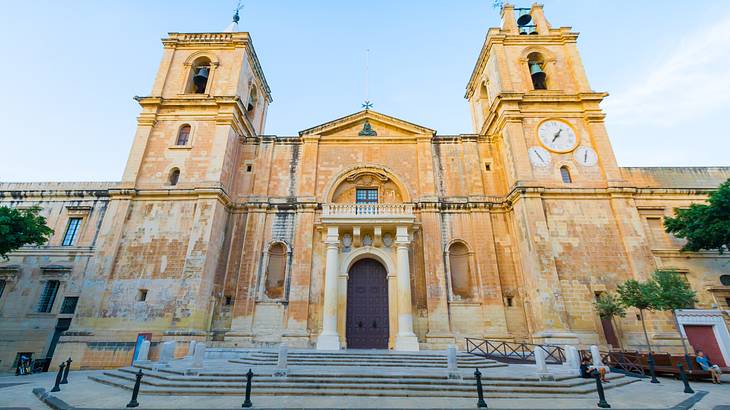
Saint John's Co-Cathedral, Valletta, Malta
Saint John's Co-Cathedral is a Roman Catholic cathedral in Valletta, Malta. The cathedral shared the honour with St. Paul's Cathedral, being the main church for the Bishop of Malta in the 1820s (hence the "Co-cathedral" name).
This cathedral is dedicated to St. John the Baptist. It was constructed in the 16th century in a Baroque style. The exterior of the church is relatively minimalist compared to some other European cathedrals.
In contrast, the interior features ornate details with walls and ceilings covered in intricate designs. There are also marble floors, gold arches, and hand-painted ceilings.
Additionally, the cathedral features two masterpieces by Caravaggio: The Beheading of Saint John the Baptist and Saint Jerome Writing, among other artworks.
🏨 Stay in close proximity to St Johns Co-Cathedral
- Palais le Brun (loved by guests)
- The Phoenicia Malta (exceptional rating)
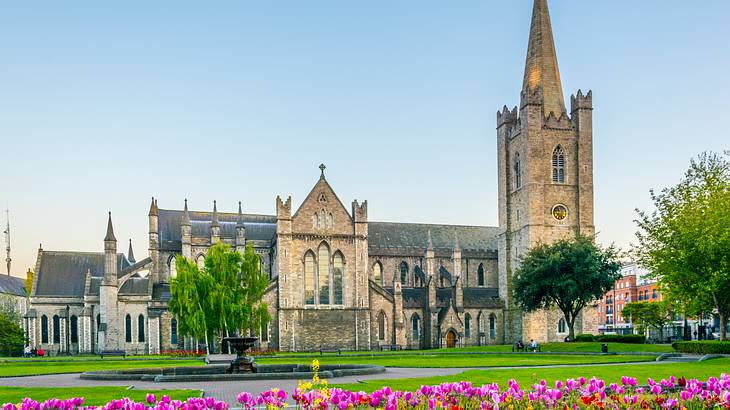
St Patrick's Cathedral, Dublin, Ireland
Founded in 1191, St Patrick's Cathedral is the national cathedral of the Church of Ireland. Found in Ireland's capital city of Dublin, it is one of the largest churches in the country and is one of the most famous landmarks in Ireland.
This breathtaking cathedral features tall spires, stunning stained glass, high ceilings, and many religious statues. The remains of Jonathan Swift, writer of Gulliver's Travels and Dean of the church in the first half of the 1700s, are buried here too.
This landmark is notably the only cathedral in Ireland that still has a daily sung service. If planning to visit, there is a small entrance fee. This fee helps with the cathedral's upkeep and is definitely worth it to enjoy this religious site.
🏨 Accommodations in close proximity to St Patricks Cathedral
- Hard Rock Hotel Dublin (top-rated)
- The Spencer Hotel (soak up the sun poolside)
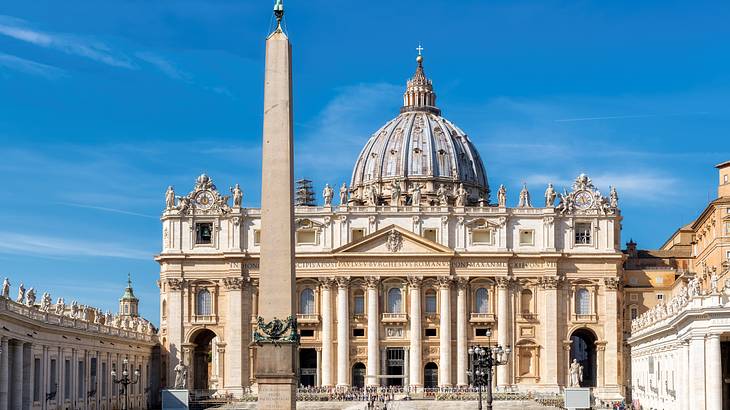
St. Peter's Basilica, Vatican City
Vatican City is a country that was created for the Catholic religion. Officially known as The Papal Basilica of Saint Peter, Catholics built Saint Peter's Basilica as a symbol to God and a place of worship.
Construction for the church started in 1506 under Pope Julius II, but Pope Nicolas completed it in 1615.
St. Peter's Basilica is the largest Christian church in the world. Even though Catholics mostly visit this church, you can also see it even if you're unreligious.
If you happen to be in the Vatican City when in Italy, and you love art and architecture, then St. Peter's Basilica is an excellent landmark in Europe for you to explore!
🏨 Stay near St Peters Basilica
- Gemme di Roma Accomodation (rated highly)
- Hotel Degli Aranci (rated 4-stars)
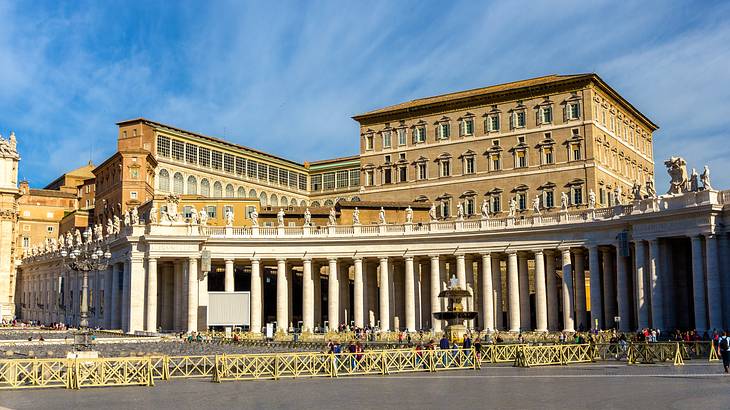
Apostolic Palace, Vatican City
Have you ever wondered where the Pope lives? The Pope, being the head of the Catholic Church, is a big responsibility that comes with some perks.
The Apostolic Palace is where the Pope officially resides. It is located in the Vatican City, in the Latium region of Italy. Another name given to the Apostolic Palace is the Papal Palace. You can also find the Vatican Museums and the Vatican Library here.
The Vatican Museums has over 50 galleries from famous artists like Da Vinci and Raphael. This incredible landmark has stunning gardens as well, which extends over an area of 55 hectares.
🏨 Place to stay near Apostolic Palace
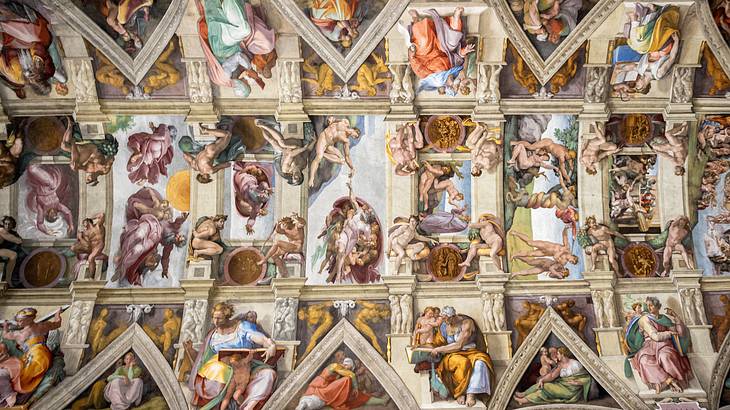
The Sistine Chapel, Vatican City
The Sistine Chapel is well-known as the home of Michelangelo's frescoes.
The Chapel is found in the Apostolic Palace located in Vatican City. It was named after Pope Sixtus after he restored it between 1473 and 1481. The Sistine Chapel is the place to find the best frescoes in the world.
When visiting the Chapel, it is recommended to pause and find a seat somewhere around the edge of the building. Once seated, you can enjoy gazing up at the frescoes as you absorb the serenity of the place.
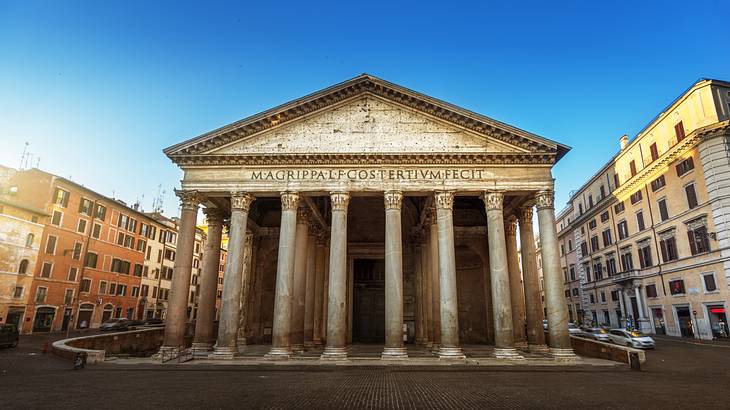
Pantheon, Rome, Italy
The Pantheon is a Catholic Church in Rome, Italy. It was a Roman temple commissioned by Marcus Agrippa before it was transformed into a church.
The transformation, or rebuilding of the landmark, was under the supervision of the Roman emperor, Hadrian, around 120 AD. This rich history and its impressive architecture makes the Pantheon a top landmark in Europe.
The Patheon is a must-visit landmark when you travel to Italy because it is one of the country's oldest and most prominent monuments. When you visit, you will realise that the only source of light at the Pantheon is through the oculus. This is a round opening at the top, allowing for sun rays and rainwater to pass through.
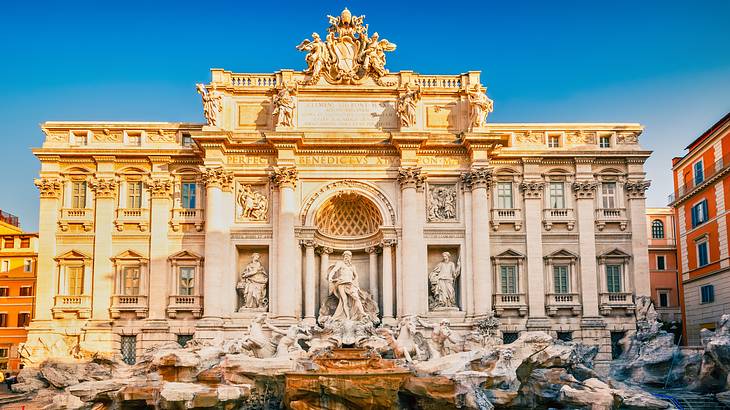
Trevi Fountain, Rome, Italy
The Trevi Fountain is an extremely popular and famous landmark in Europe. It's included on almost every walking tour of Rome, and it is featured in many guide books about Rome. The fountain is probably the most famous water fountain in the world, and as of 2020, it has been featured in at least four different Hollywood films.
In 1629, the initial fountain was declared to not be dramatic enough by Pope Urban VIII, so he commissioned an Italian artist and architect to draw a new one. Unfortunately, the project never commenced and was abandoned when the pope died.
In 1730, another pope, Pope Clement XII, organised a competition to redesign the fountain. This time a design was chosen that had elements of inspiration from the drawings done in 1629. By 1762, the fountain was complete and has existed in that form ever since.
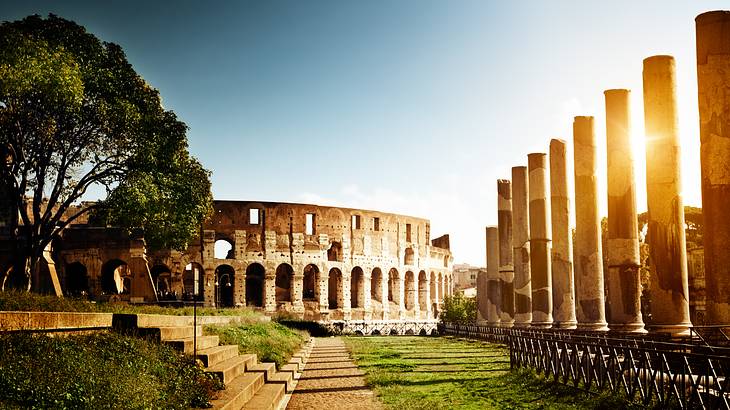
Colosseum, Rome, Italy
Today, stadiums and theatres are used to host sporting events and drama shows, respectively, but this was not the case in the past.
Amphitheatres were the buildings that used to host both sporting games and plays. The Colosseum is an example of how amphitheatres used to look like.
The Colosseum is the biggest amphitheatre in the world, accommodating between 50,000 to 80,000 spectators. It was actively used during the Roman Empire and is located in the centre of Rome in Italy.
The Colosseum remains one of the most iconic landmarks that cannot be missed when visiting Europe, especially if in Rome for a few days.
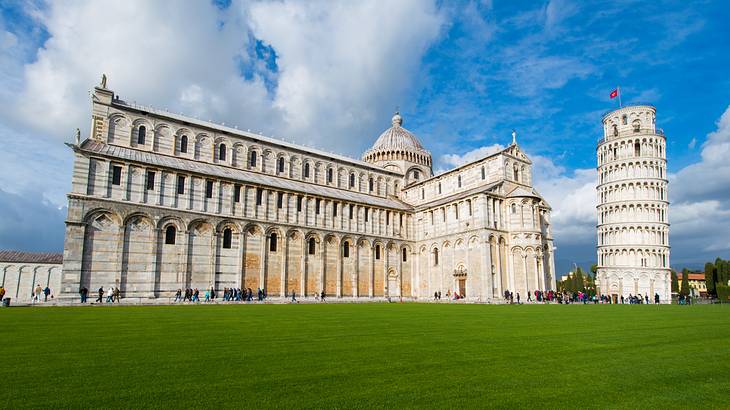
Leaning Tower of Pisa, Pisa, Italy
Pisa is a famous city in Italy, mainly because of its Leaning Tower. The Leaning Tower is located in Piazza dei Miracoli, and it is a campanile (bell tower).
The bell tower is mainly popular because of its lean of about 4 degrees towards the ground. The building's lean was caused because of engineering mistakes. Over the years, the tower has undergone many corrections to make it more stable and safe for tourists.
There is no need to be scared because the managers of the landmark have taken strict protocols to ensure the visitor's safety. The tower also has about 300 steps that lead to the top of the structure. Once you reach the top, you get the opportunity to relax and enjoy the breath-taking view of Pisa.
🏨 Accommodations close to Leaning Tower of Pisa
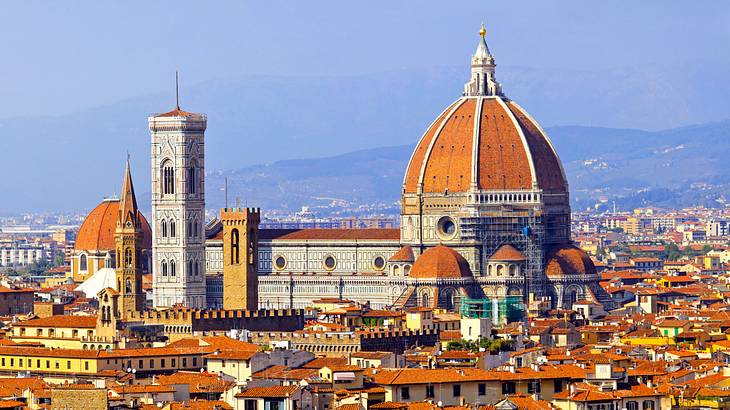
Florence Cathedral, Florence, Italy
With construction beginning in 1296, the Florence Cathedral is one of the most famous landmarks in Italy and Europe. Engineer Filippo Brunelleschi was in charge of the construction till completion in 1436. The cathedral was built in a Gothic architectural style, and is a must for your 3-day Florence itinerary!
The exterior portions of the cathedral are decorated with colours ranging from white, pink, and green. However, the interior is plain, but this becomes a benefit during the summer as it makes the place cooler. There is also no entrance fee, which is excellent for budget-conscious travellers who want to explore fantastic art and frescoes for free!
🏨 Stay near Cathedral of Santa Maria del Fiore
- B&B Galileo 2000 (top-rated)
- 25hours Hotel Florence Piazza San Paolino (4-star rating)
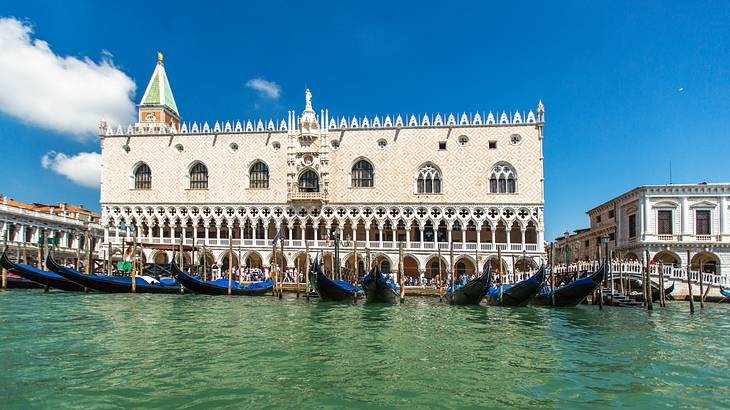
Doge's Palace, Venice, Italy
A prolific landmark located in Piazza San Marco in Venice is Doge's Palace. The Palace was constructed in 1340 and is in the Venetian Gothic architectural style. It is a must-see if you are in Venice for four days.
Historically, Doge's Palace was the home of the Doge of Venice. The word doge is synonymous with "chief," a title reserved for the head magistrate of either Venice or Genoa.
Today, Doge's Palace is a museum that allows tourists to explore the many rooms of the Palace. Each room is filled with historical, beautiful, and rare art pieces - both sculptures and paintings. Doge's Palace is a stunning landmark, which is why it is one of the best landmarks in Europe.
If you are visiting Doge's Palace in the region of Veneto, you should consider purchasing an audioguide or joining a tour group. You can learn a lot from a guide, whether audio or in-person, that you won't be able to gain by directing yourself through the various rooms.
🏨 Places to stay close to Doges Palace
- Hotel cà Zusto Venezia (rated very highly)
- H10 Palazzo Canova (rated 4-stars)
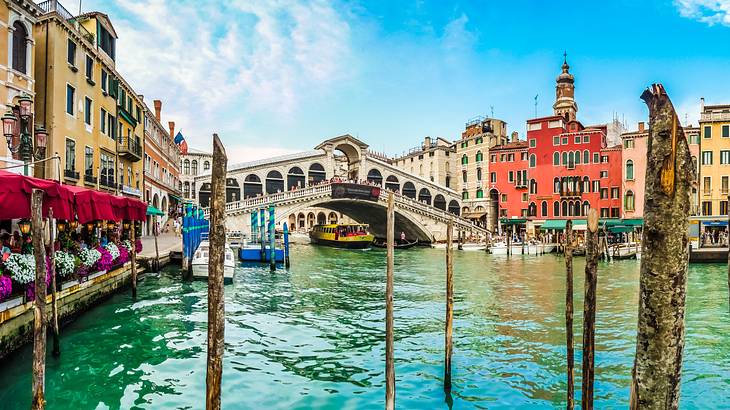
Rialto Bridge, Venice, Italy
Venice is known as the city of canals, and the Rialto Bridge is the most famous bridge to cross these waterways. The current bridge was constructed in the 1500s and sits across the renowned Grand Canal.
The Rialto Bridge is notably the oldest of the four bridges that cross this canal. Tourists flock to snap pictures of the landmark, and you can also walk across it.
🏨 Accommodations near Rialto Bridge
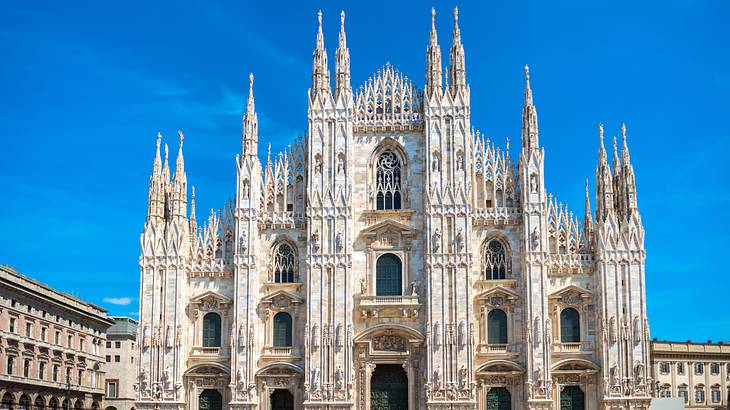
The Duomo, Milan, Italy
The Duomo, or Milan Cathedral, is a world-renowned symbol of Milan. It is additionally one of the largest cathedrals in Europe and is a must for any 2 day Milan itinerary.
Construction of this cathedral began in 1386; however, it was not considered completed until 1965. The cathedral's Gothic design includes 135 spires and over 3,000 gargoyles and statues.
Along with taking in the beauty of the cathedral's interior and exterior, the rooftop terrace offers panoramic views of Milan. Whether you are religious or not, the Duomo is a must-visit famous landmark in Europe.
🏨 Accommodations nearby Duomo di Milano
- The Corner Duomo Hotel (4-star rating)
- Hotel Sanpi Milano
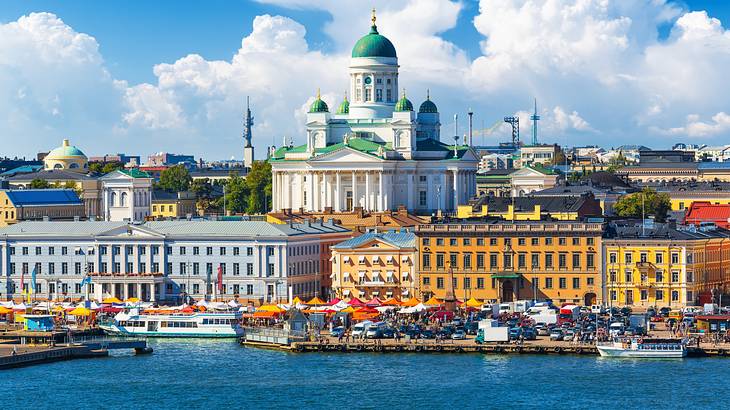
Helsinki Cathedral, Helsinki, Finland
Opened in 1852, Helsinki Cathedral is a renowned Finnish landmark. The cathedral sits close to the equally famous Senate Square and was designed in a Neoclassical style.
Visitors today flock to the church to admire its architecture and learn more about its history. You can also still attend services, with the cathedral built to hold approximately 1,300 people.
🏨 Places to stay close to Helsinki Cathedral
- Lapland Hotels Bulevardi (well-regarded)
- Hilton Helsinki Strand (5-star rating)
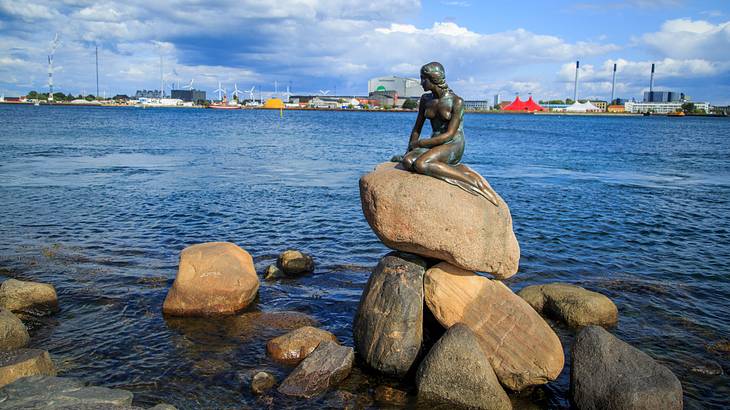
Little Mermaid Statue, Copenhagen, Denmark
The Little Mermaid Statue is an iconic sculpture created by Edvard Eriksen in 1913. The famous landmark in Denmark sits on the Langelinie promenade in Copenhagen and shows a mermaid turning into a human.
Eriksen was inspired by Hans Christian Anderson's 19th-century fairytale, The Little Mermaid, which most people will know from various Disney remakes.
🏨 Stay near The Little Mermaid
- Copenhagen Admiral Hotel (rated highly)
- NH Collection Copenhagen (rated 5-stars)
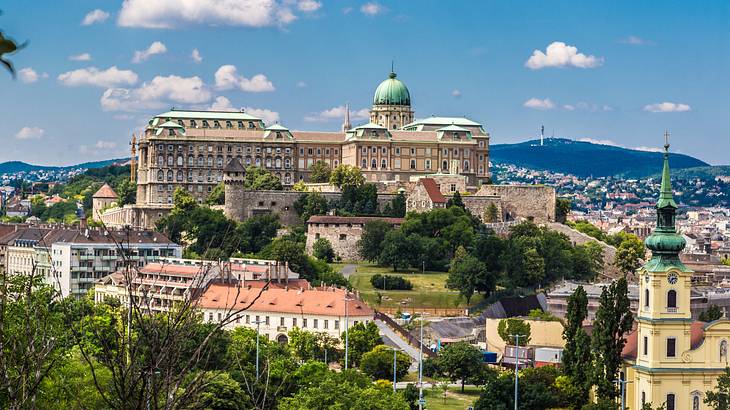
Buda Castle, Budapest, Hungary
Buda Castle, formerly referred to as the Royal Castle, is an ancient citadel for the Hungarian kings of Budapest. It was completed in 1265, but what you see today was built between 1749 and 1769. Aside from the exterior, the castle is a gigantic and famous monument in Europe with exceptional complexes and points of interest inside.
If you are in Hungary and you want to learn about the history of the Hungarians, the galleries and museums housed inside the castle are very informative.
If in Budapest for a few days over a long weekend, make sure to stop by one of its many fantastic thermal baths as well.
🏨 Stay nearby Buda Castle
- 7Seasons Apartments Budapest (loved by guests)
- Up Hotel Budapest (4-star rating)
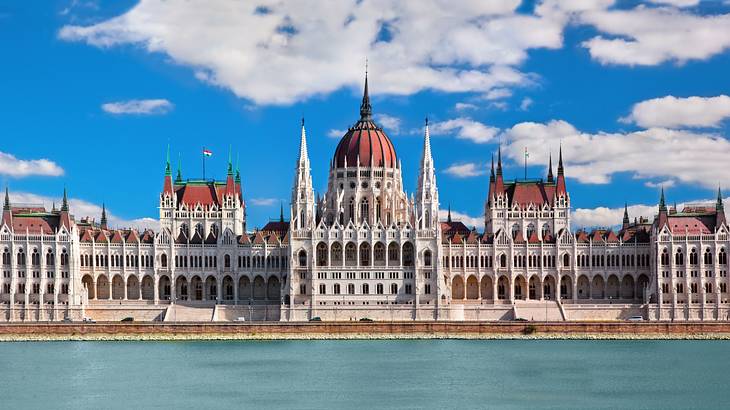
Hungarian Parliament Building, Budapest, Hungary
The Hungarian Parliament Building, or Parliament of Budapest, is found in Kossuth Square on the banks of the Danube River. This building is one of the most famous landmarks in Hungary. It is also one of the largest parliament buildings in the world.
The parliament building currently acts as the seat of the National Assembly. The building itself is a stunning piece of architecture. It is designed in a neo-Gothic style and was inspired by the Houses of Parliament in England.
Those visiting can explore inside with tours running each day from 8 am to 6 pm. Even if you do not have time for a tour, just viewing the building from the outside is recommended. The parliament building is a less globally known location but is a must-see landmark in Europe nonetheless.
🏨 Accommodations near Hungarian Parliament Building
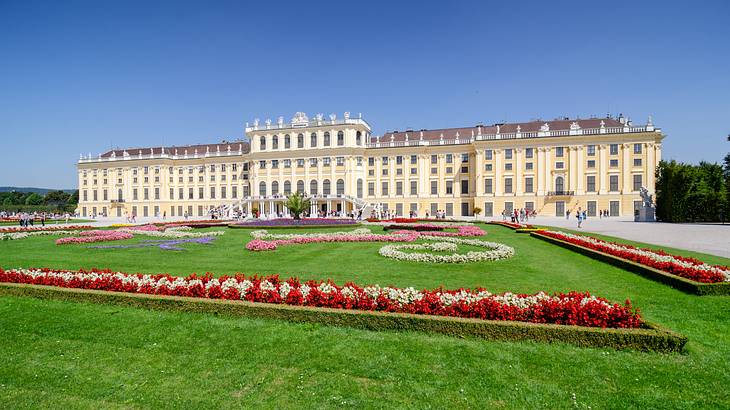
Schönbrunn Palace, Vienna, Austria
The Habsburg lineage of rulers left an impressive mark on Europe. The Schönbrunn Palace was the summer residence of the Habsburgs. Today, the Palace is a major tourist site that attracts thousands of visitors worldwide. Even with just two days in Vienna, a visit to this Palace is a must!
The publicly accessible portion of the Palace comprises about 40 different rooms that can all be seen on the Grand Tour. The Grand Tour takes approximately one hour to complete and is best enjoyed with an audioguide that narrates your journey throughout each room.
After you have explored the Palace's interior, you can also enjoy a walk through the gardens surrounding this famous Austrian landmark. As the Habsburg rulers' summer residence, there is a lot to see. During the warmer months, the plants in the gardens are usually flowering.
Arriving early and completing the Grand Tour, then exploring the gardens later as the crowds start to build, is recommended. Sharing the garden with a large group is more enjoyable than navigating the herds of people inside the Palace.
The rich history and sheer grandness of the Schönbrunn Palace make it a top landmark in Europe to visit as a tourist.
🏨 Stay near Schönbrunn Palace
- Jaz in the City Vienna (highly acclaimed)
- Austria Trend Hotel Bosei Wien (rated 4-stars)
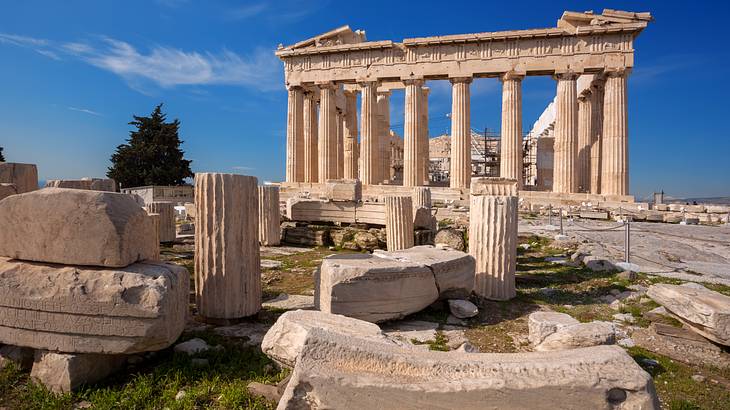
Acropolis, Athens, Greece
Greece is a country with many Greek landmarks that attract thousands of visitors. Athens is a city in Greece filled with a rich history, amazing landscapes, and many historic European buildings.
The Acropolis, located in Athens, is one of the most famous landmarks in Greece and in the world. The Athens monuments found at the Acropolis symbolise the ancient Greek civilisation. It was built in the fifth century by Greek rulers to show how powerful they were in their time.
One of the main reasons you should visit the Acropolis when you find yourself in Greece is the Parthenon. The Parthenon has a fascinating history; it was dedicated to the goddess Athena, the patron of the Greek empire.
The Parthenon saw construction begin in 447 BC. It is the place to be if you're in Athens for a couple of days, and you want to escape back in time.
🏨 Accommodation nearby Acropolis of Athens
- Iasonos Suites Athens (well-rated)
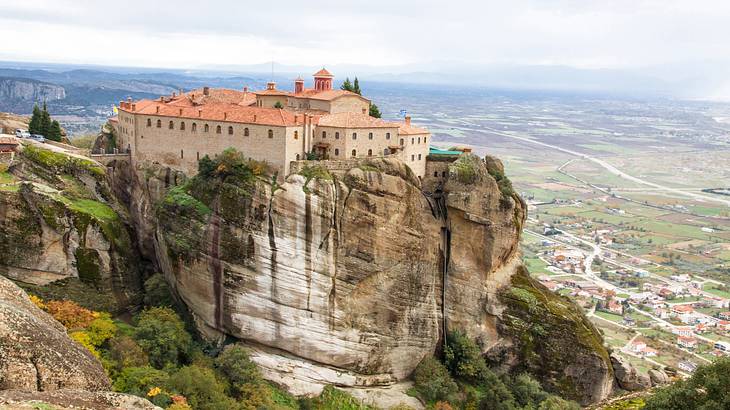
Meteora, Kalabaka, Greece
Greece's Meteora is an impressive rock formation located in the small town of Kalabaka on the Plain of Thessaly. The area houses the remains of about 24 Eastern Orthodox monasteries which sit on natural rock pillars and mountains.
It's thought that many of the structures were built in the 13th and 14th centuries, and Meteora gained UNESCO World Heritage status around 600 years later, in 1988.
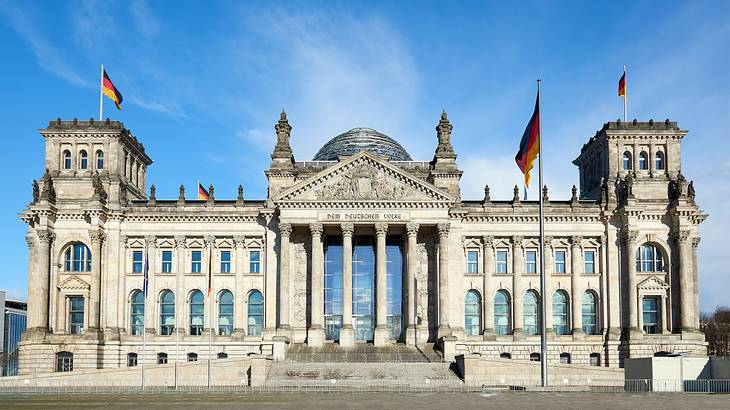
Reichstag Building, Berlin, Germany
One of the most impressive landmarks in Germany and Europe is the Reichstag Building. The Reichstag Building houses the parliament of Germany, the German Bundestag (the government body). Parliament conducts all its affairs from this building. However, the building is open to tourists when parliament is not taking place.
The dome is one of the most popular places to visit in the Reichstag Building. The dome is a glass and metal structure at the top of the Reichstag Building that tourists can explore to learn more about the building's history.
An audio guide is available when visiting the dome, which is highly recommended. It is a short tour, but the guide provides interesting insights. Make sure you book your trip to this landmark online and well in advance.
🏨 Stay nearby Reichstag Building
- Motel One Berlin-Alexanderplatz (highly acclaimed)
- The Westin Grand Berlin (5-star rating)
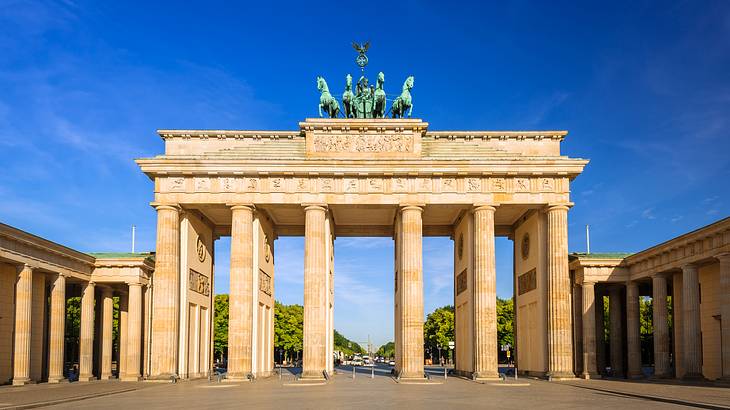
Brandenburg Gate, Berlin, Germany
When you are in Berlin, Germany for 4 days, the Brandenburg Gate is a place you must include on your list of places to visit in Europe. The monument was built based on orders from Frederick William II, the Prussian King, during the 18th century. It has witnessed many historical events and symbolises the Cold War in Berlin.
This European monument is always open, but if you want to experience an incredible moment with your family, the best time to visit is during New Year's Eve. You can also take a stroll around the gate and enjoy the calm environment of the city.
🏨 Places to stay near Brandenburg Gate
- Hyperion Hotel Berlin (top-rated)
- TITANIC Chaussee Berlin (4-star rating)
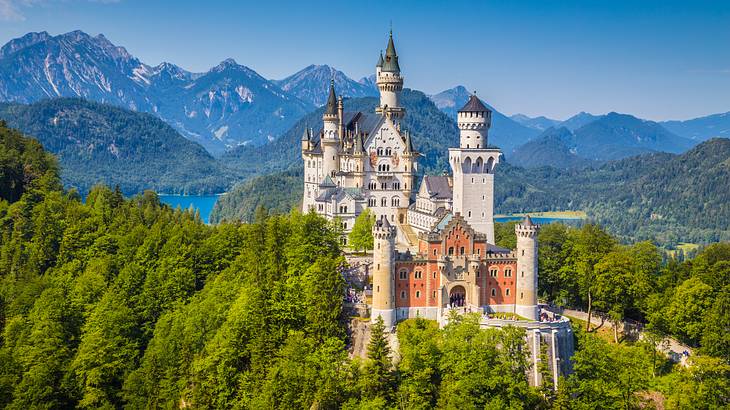
Neuschwanstein Castle, Bavaria, Germany
In Bavaria, Germany, is the Neuschwanstein Castle, a 19th-century palace that served as inspiration for Disney's Sleeping Beauty castle.
Neuschwanstein Castle is a landmark that cannot be overlooked when you talk about Germany's imperial past. The Castle was commissioned by Ludwig II, and it is just a short drive away from Munich.
If you happen to be in Munich, taking a short day trip to Neuschwanstein Castle will make your day even better. On your way to one of the most magical castles in Europe, you will get the opportunity to view the country-side of Germany, too.
🏨 Accommodations near Neuschwanstein Castle
- Hotel Alpenstuben (well-regarded)
- Villa Ludwig Suite Hotel (rated 4-stars)
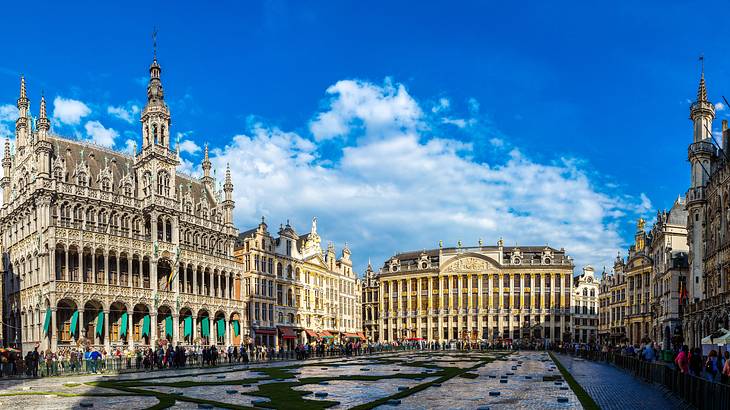
Grand Place, Brussels, Belgium
The central square in Brussels, the capital of Belgium, is aptly named the Grand Place. It took form in the 11th century as trade began to take place in the area.
The square became even busier in the 13th century as stone and wood buildings were constructed around the perimeter, giving foundation to the large impressive buildings present today.
As with most prominent main squares in cities, the Grand Place has been an important landmark in Brussel, and Europe's history. In 1523, it witnessed the burning of Hendrik Vos and Jan van Essen, protestant martyrs during the inquisition that took place in Brussels.
In 1568, Egmont and Hoorn were beheaded here due to religious descent. In more recent history, in 1695, the square was heavily damaged by French troops of marshal De Villeroy.
Today, the Grand Place is a famous Europe landmark and a great place to start exploring Brussels from if here for a couple of days.
If you're in Belgium for longer, do make sure to take a short trip to Bruges and a day trip to Ghent in the region of Flanders as well - two super cute towns in Belgium!
🏨 Accommodations close to Grand Place
- Hostel Bruegel (good value)
- Motel One Brussels (scored highly by guests)
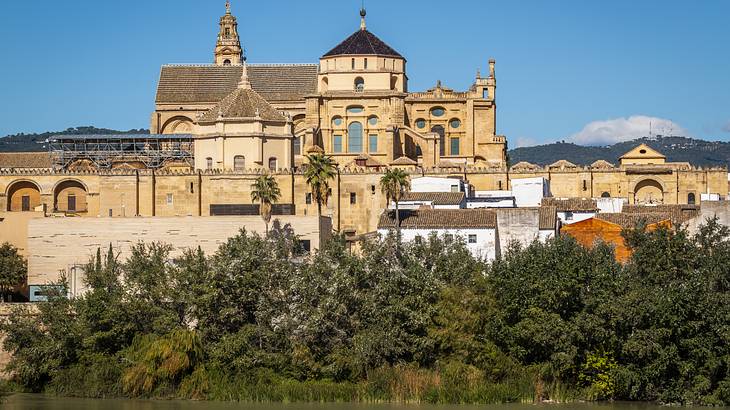
Mosque-Cathedral of Cordoba, Cordoba, Spain
Another UNESCO World Heritage Site is the Mosque-Cathedral of Cordoba. It is a must-see even if you're in Cordoba for just one day. The Cathedral of Our Lady of the Assumption is the official name of this building.
The Church is dedicated to the Virgin Mary. It is located in Andalusia, Spain, and serves as both a church and a mosque. The catholic side functions effectively with services held daily, unlike the mosque, whereby prayers are not allowed.
When you visit this landmark, you will notice the different architectural styles because of the two religions. This shows how there is unity between both faiths. Art from the Muslims does not include any animal or human figures, with most Christian art in the middle of the building.
🏨 Places to stay near Mosque-Cathedral of Córdoba
- Hostal la Fuente (affordable)
- Hotel Cordoba Center (good value)
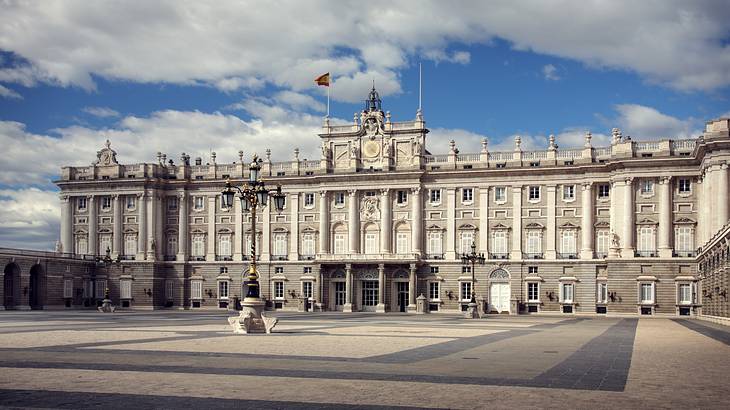
Royal Palace of Madrid, Madrid, Spain
Like the UK royal family residing in Buckingham Palace in the UK, the Spanish royal family lives in The Royal Palace of Madrid. Today, the Palace is used mainly for state ceremonies and is one of the biggest palaces in Europe.
The Royal Palace of Madrid contains 3,418 rooms and covers an area of 135,000 square meters. It is one of the most visited attraction sites in Europe and is a must-see if in Madrid for a few days.
The Palace was built in the 16th century, but unfortunately, it was burned in 1734. King Philip V, the king at the time, ordered the Palace's rebuilding at the same site. The Royal Palace of Madrid has paintings and frescoes from artists like Caravaggio, Juan de Flandes, and Giovanni Battista Tiepolo if you love art.
🏨 Places to stay close to Royal Palace of Madrid
- Hotel Liabeny (scored highly by guests)
- Exe Moncloa (relax by the pool)
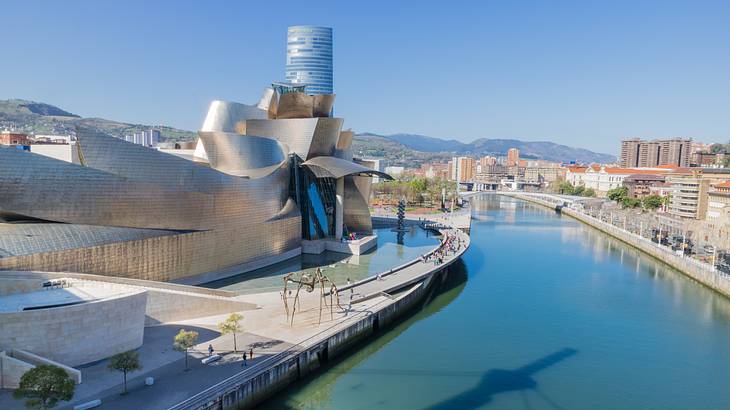
Guggenheim Museum, Bilbao, Spain
Guggenheim Museum Bilbao is one of the notable museums in Spain. It is located in the city of Bilbao. The museum was designed by Frank Gehry in 1993, a Canadian-American architect who created this place to serve as a museum for modern and contemporary art.
After construction was complete, King Juan Carlos I of Spain took the honour to inaugurate the museum in October 1997. The museum opened, exhibiting over 200 contemporary artworks.
Comparing the Guggenheim Museum to other landmarks in Europe makes this attraction seem more current. This proves that architects are still trying their best to produce the best buildings in present times. This is the place to be when you want to enjoy contemporary art in a fantastic destination.
🏨 Nearest accommodations to Guggenheim Museum Bilbao
- Zubia Urban Rooms (well-priced)
- Vincci Consulado de Bilbao (well-rated)
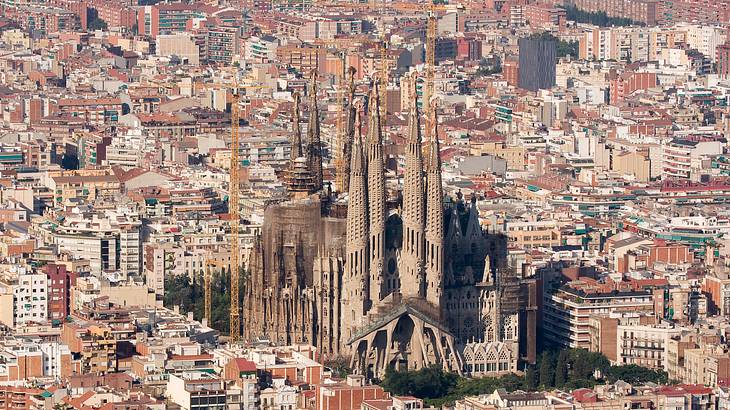
Basilica of the Sagrada Familia, Barcelona, Spain
Sagrada Familia is a Gaudi-designed catholic basilica that has been under construction for hundreds of years - it started in 1882 and is continuing today! The Basilica of the Sagrada Familia is a UNESCO world heritage site and an important historical landmark in Europe.
When visiting the basilica in Barcelona, Catalonia, you need to book ahead of time to secure an entrance ticket. A ticket will allow you to explore the exterior and interior of the basilica.
You should pick up an audio guide - walking around yourself will result in you missing out on some interesting facts. The basilica is well signposted; however, various ornaments, sculptures, and paintings have fascinating backstories not explained on the tourist signs throughout the basilica.
Barcelona is a great place to explore, even with just 48 hours, and has loads of unusual things to do as well.
🏨 Accommodations nearby La Sagrada Familia
- Gran Hotel Havana by Escampa Hotels (well-rated)
- Catalonia Plaza Catalunya (unwind poolside)
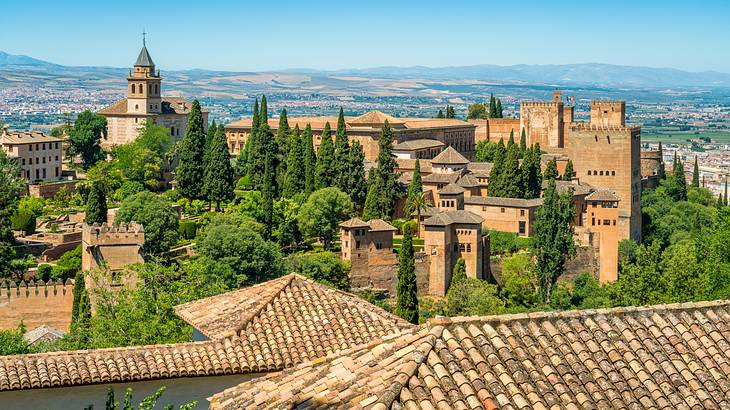
Alhambra Palace, Granada, Spain
The Alhambra Palace is one of the most famous landmarks in Spain, and it is a must-see even if in Granada for just 2 days. It was erected by the Arabs on a hilltop in Granada, with construction beginning in 1238. The Palace was constructed as a military base for the Nasrid Dynasty.
Today, Alhambra Palace is used as a museum, allowing tourists to visit this magnificent European landmark every year.
The Palace maintains impressive cultural and architectural legacies to show its visitors, such as the Generalife Palace's gardens, which are adjacent to Alhambra. You should take your time to enjoy them by walking through at a leisurely pace.
🏨 Stay near Alhambra
- Hotel Andalucía Center (good value)
- Gran Hotel Luna de Granada (top-rated)
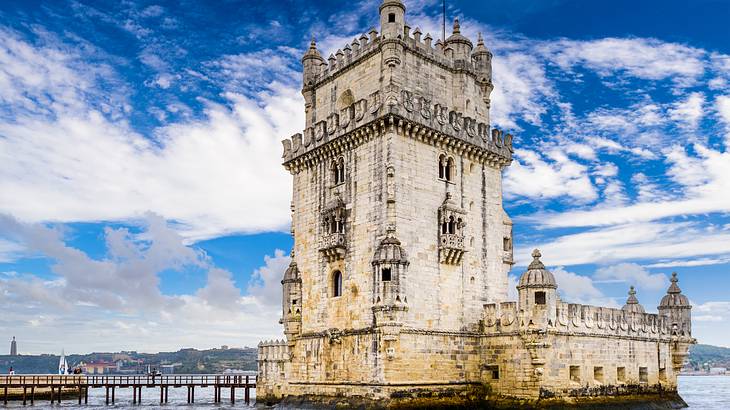
Belém Tower, Lisbon, Portugal
There are many landmarks to see in Lisbon, so if you plan to travel to this city for a vacation, make sure you spend at least 48 hours in Lisbon.
One of the most impressive landmarks in Lisbon is the Belém Tower, formally known as the Tower of Saint Vincent. Belém Tower served as a site of embarkation and disembarkation for Portuguese explorers and as a ceremonial gateway to Lisbon.
One good thing about visiting the Belém Tower is that you are not limited to one location. As a visitor or tourist, travelling to a country for one attraction is not logical. The tower's location is close to other sights, making it easier for you to explore the rest of the city.
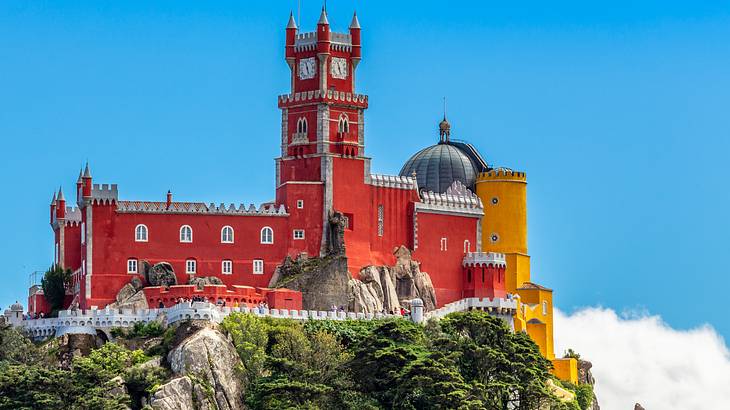
Pena Palace, Sintra, Portugal
Pena Palace and Park, or Parque e Palácio da Pena, is located in Sintra on the Portuguese Riviera.
The palace sits on top of a hill in the Sintra Mountains and can be seen from Lisbon on clear days. This medieval-style palace was built in the 1850s. It is designed in a Romanesque style and features bright yellow and red walls.
Visitors can take in the beautiful exterior before exploring inside. The palace's interior is decorated in the way it would have been hundreds of years ago.
You will be able to see bedrooms, kitchens, reception rooms, and a chapel, among other rooms and buildings. Each room is decorated with royal furniture, artworks, and other artefacts.
Having thoroughly explored the palace, you can wander around the surrounding 200-hectare park. This famous Portuguese landmark features beautiful gardens and flora from across the globe.
🏨 Nearest accommodations to Park and National Palace of Pena
- Moon Hill Hostel (value option)
- Zen Museu do Bonsai (rated highly)
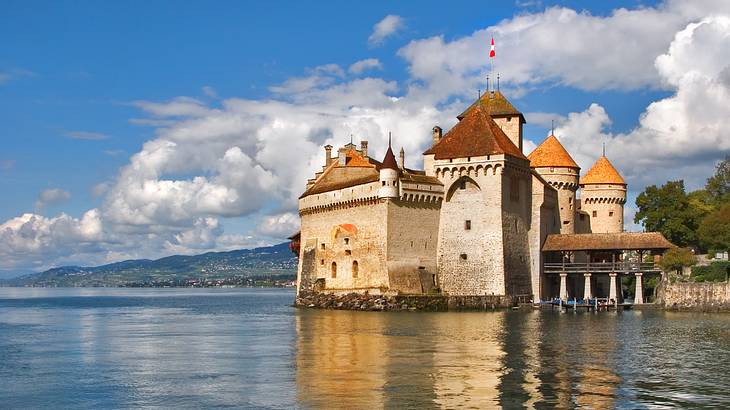
Chateau de Chillon, Veytaux, Switzerland
Geneva is the second most populated city in Switzerland, after Zurich, and has many famous Swiss landmarks for you to visit. Chateau de Chillon is a castle on Lake Geneva, near Montreux, and is one of the most famous places in Europe.
The Duke of Savoy called Chillon Castle home. The castle was used to control the movement of ships on Lake Geneva for nearly four centuries. You can explore the castle's many bedrooms, chambers, and courtyards here.
🏨 Places to stay near Chillon Castle
- Royal Plaza Montreux (5-star luxury)
- Hotel Victoria Glion (4-star)
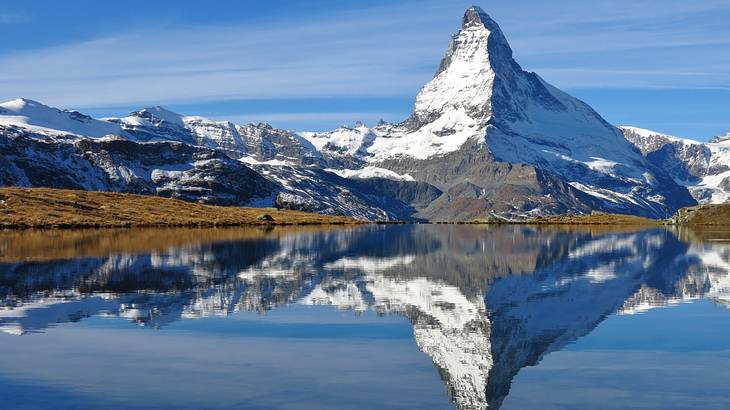
Matterhorn, Zermatt, Switzerland
This natural landmark in Europe is part of the Alps mountain range. It is located in Zermatt, Switzerland on the border with Italy.
The Matterhorn is the most famous of the mountains in the Alps. With its summit at 4,478 metres high, it also has one of the highest summits in both the Alps and Europe. The jagged triangular mountain attracts tourists all year, from naturists to those in the alps for snow sports and other alpine activities.
Visitors to Zermatt can view the Matterhorn from many places. This includes from a three-thousand-metre high mountain viewing platform at the Gornergrat. There is additionally a Matterhorn museum to check out. Here you can learn more about the mountain and the history of the area.
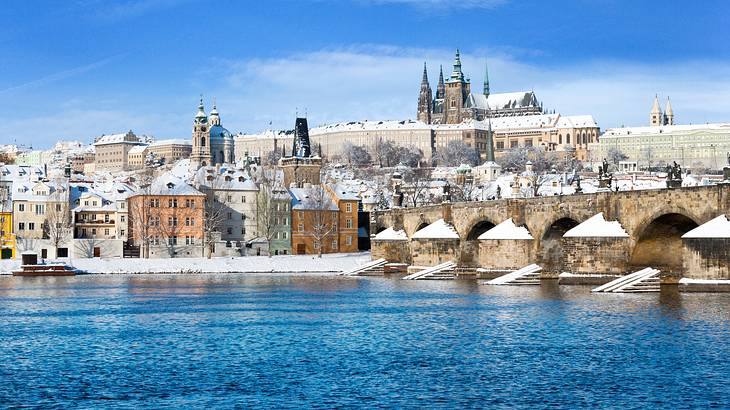
Prague Castle, Prague, Czech Republic
Prague Castle is one of the biggest castles in the world, covering over 70,000 square metres. It contains more than 700 rooms and is found in the Czech Republic's capital of Prague.
The castle's construction began in the 9th century, but construction was ongoing, with changes being made until 1930. The castle, therefore, features a combination of architectural styles, including Gothic, Romanesque, and Baroque.
Today, the castle acts as the office of the President of the Czech Republic. It is additionally the most visited tourist attraction in Prague.
Notably, the Bohemian Crown Jewels are kept here. However, they are not on display, and where exactly they are kept in the castle is a secret.
Visitors here will get to explore multiple buildings within the complex, including a cathedral and a Basilica. There are also gardens to wander around, and guided tours are available.
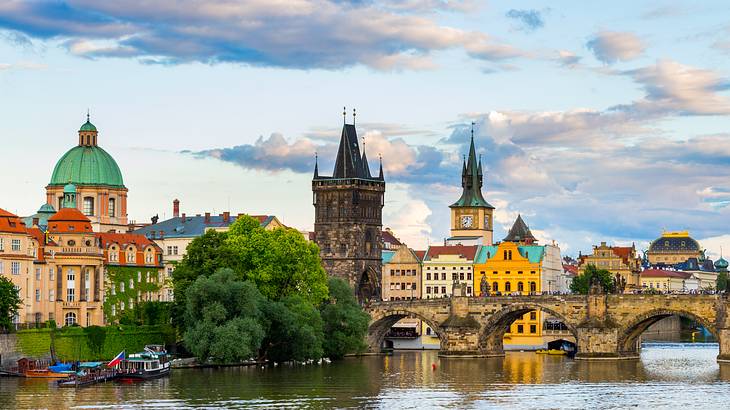
Charles Bridge, Prague, Czech Republic
The Charles Bridge was constructed under the supervision of King Charles IV. Construction started in 1357 and was completed in 1402, taking almost 50 years.
The Bridge is a historic bridge that goes over the Vltava River in the city of Prague, Czech Republic. It connects two Prague districts and is 516 meters long and 10 meters wide. When you are in the capital of the Czech Republic, you cannot miss it.
Charles Bridge is the ideal place to go for a walk with your family. It is also a popular landmark for couples as it's a romantic thing to do in Prague.
If you want to enjoy the calm nature of the Bridge, visiting during a weekday is the best option. This is because many tourists prefer coming on the weekend, crowding the Bridge.
🏨 Stay in close proximity to Charles Bridge
- Wellness Hotel Extol Inn - Czech Leading Hotels (value for money)
- Hotel Rott (loved by guests)
Conclusion
Europe is a big continent with many unique landmarks for tourists to visit. The list provided above is merely a guide for you for when you are ready to plan your travel to Europe.
You should include at least one of the above European landmarks, depending on where you want to travel to. You will surely not be disappointed!
You can go the extra mile by trying to explore all the landmarks listed above when you get the chance!
Want to keep exploring?
Subscribe for discounts on tickets and hotels and our latest guides.
Thank you for subscribing
We will be in touch soon with discounts on tickets and hotels and our latest guides.
Want to keep exploring?
Subscribe for discounts on tickets and hotels and our latest guides.
Thank you for subscribing
We will be in touch soon with discounts on tickets and hotels and our latest guides.

